#Post Christendom
Text
While the obvious parallel (even made explicit in the text) is with the Grimm Brothers’ “Little Mermaid”, the animated film “Bubble” (2022) contains nearly all of the elements of a Christological narrative. In this essay I will
#bubble anime#christology#uta is the daughter of David#she takes the form of humans and grows to love them#dying in order to save their world from the wrath of her word#along the way helping hibiki self actualize#uta#hibiki#battlekour#do people still say in this essay I will#I have no idea how tumbler works#short post#like? is it necessary to note the length of post!#joke post#media analysis#I’m not even Christian anymore it just tickles me#I treat Christendom like it’s the lore of Skyrim#eloi eloi#lama sabchthani
15 notes
·
View notes
Text
The Colors of Crowley
Black is the color Crowley uses to cover himself, red is the color that represents Crowley to himself, and yellow is the color that represents Crowley to Aziraphale. What each color symbolizes and how it's used give us important information about Crowley (and to some degree Aziraphale) and about the ineffable relationship.
I feel kind of dumb writing this post because I'm sure it's glaringly obvious to everyone else, but there's this Metro UK article of all things (the Metro is owned by the hardcore rightwing Daily Mail, btw, so please don't link to it) that mentions the red stitching on Crowley's gloves in 1867, and it made conscious some details I had only subconsciously noted, so fwiw to anybody else, here are my notes on the colors associated with Crowley in Good Omens and their significance in the context of the way each one is used.
I don't think we need to cover black-as-evil in Western color symbology. [And yet here's a long-ass paragraph about it anyway! --Ed.] Light:dark::good:evil has been a thing with Christianity since before Christianity was even Judaism. The Israelites picked it up from the Zoroastrians way back before YHWH had subsumed El as 'God,' which may have been before they were Israelites as well; I mean it was a LONG time ago. Good Omens has been using black and white to represent Hell and Heaven, respectively, long before the show. In the UK, the book was published in paperback with a choice of black or white cover with an illustration of the contrasting character in the contrasting color: Crowley illustrated in black, Aziraphale in white. The current hardcover is grey.
Crowley wears black, and the Bentley is black. At the metanarrative or authorial level this is obviously for the purposes of the black/white demon/angel contrast, but on the intra-narrative level, the Watsonian level, it's interesting to note that Crowley doesn't have to wear black. He's obviously not free to choose from the full color palette, but Furfur's shirt and sash are is dark emerald green, Dagon is in ultramarine (as befits a marine Elder God), and Shax has only been on Earth for four years before she's wearing head-to-toe oxblood. When she shows up later in battle dress she's got a lot of oxblood there, too. And yet Crowley wears black.

Authorial reasons aside, black suits Crowley for a couple intra-narrative reasons. For much of history, black was the most expensive color to dye and maintain in clothing, and as a result it has always been fashionable. And for several centuries in Christendom, wearing black was also a sign that you were in mourning, which was a social and religious obligation when someone close to you died. Whether you could wear other colors with it depended on how long ago that death had occurred.
Again: black is what Crowley chooses to cover himself, and as there is a sharp distinction between how Crowley presents himself to fulfill his obligations and who he thinks of himself as being, there is likewise a distinction between the colors that represent those two quantities as well.
Red is the color the show uses to represent Crowley to Crowley. The most obvious reason is his hair. This is another change from Book Omens, where Crowley is described as having hair that is "dark." A lot of fans in the UK hated the change when S1 came out because fans hate change and the British have a thing against gingers, but Crowley's red hair suits him better than dark imo because the Mother of Demons in Jewish religious literature, Lilith, is traditionally depicted with red hair. Red hair has been associated for more than a millenium in the Middle East and England and Wales with sorcery, witchcraft, demonic influence/possession, and satan-worship.
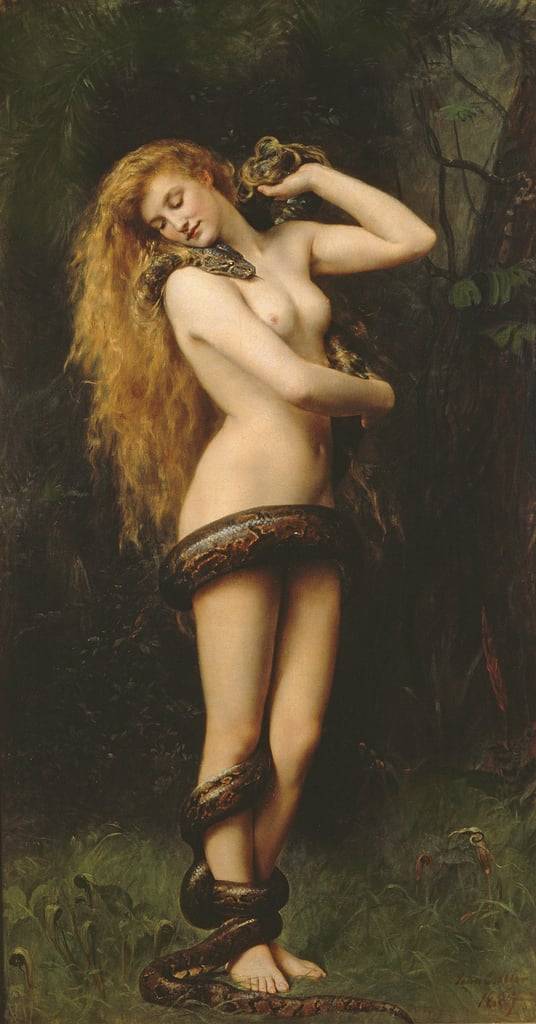
Crowley wishes his mom was this cool with snakes.
A good case can be made that Crowley genuinely likes the color red in addition to considering it demonically appropriate. I say this for three reasons. Firstly, because when he has a (limited) choice of (again, demonically appropriate) colors, he always chooses red. The marble of the desk in his apartment is not green or grey. He can have any color stitching on his gloves or lining of his jacket collar he wants, but it's always red. Secondly, it's not only red he chooses, it's almost always bright red.
We know Crowley's red isn't supposed to represent blood or violence, because we have another demon character whose use of red represents just that, and it's not the same red:
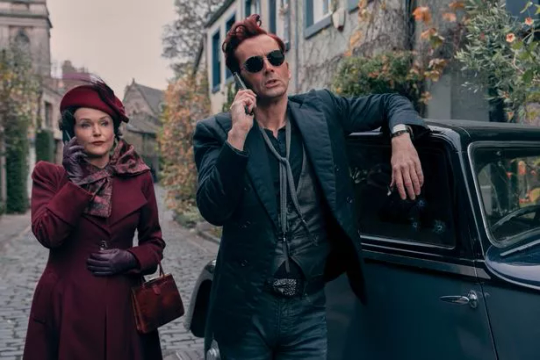
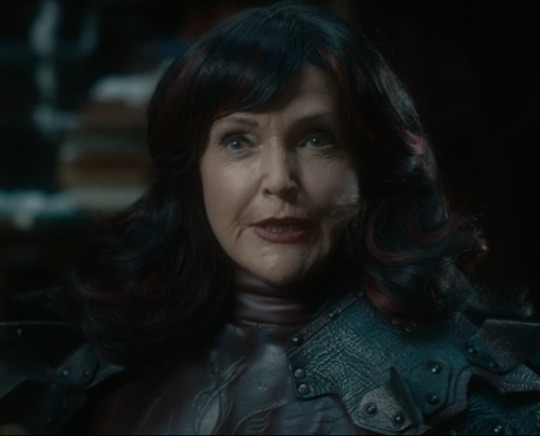
Compare Shax' oxblood and burgundy to
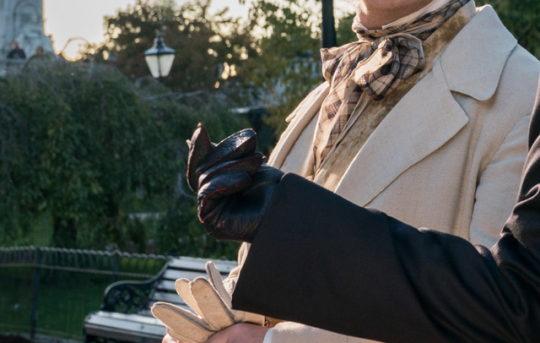
and
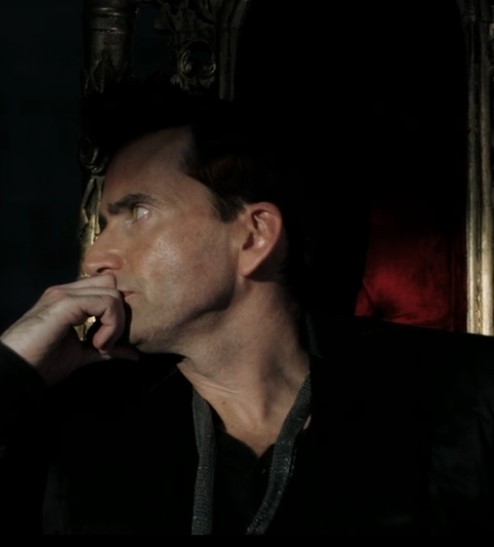
and
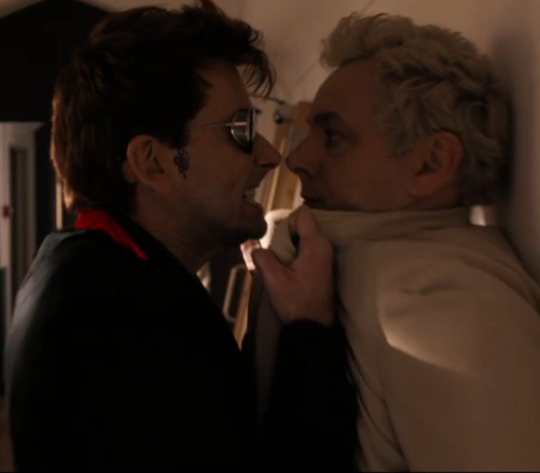
and

Crowley's red isn't just red, it's lipstick, cherry, crimson red. And in case we weren't sure that we should read this red as symbolizing passionate, romantic love:

Romantic symbolism aside, bright red is also the color of passion (romantic or otherwise), optimism, heat, vitality, life, (hell)fire, and warning.

Red and black says don't fuck with Jack.
The third reason I think we can safely say that Crowley actually likes the color red is that he hides it. It's always tiny little touches, some of which you have to look for to see. (I still don't know where they snuck in the red on his Elizabethan habit, e.g.) And we know this color is a risk for him, and that he is right to hide it, because Ligur, who doesn't approve of any of Crowley's less-than-fully-demonic embellishments and may share Hastur's opinion that Crowley has gone native, comments on one of Crowley's more noticeably colorful items.
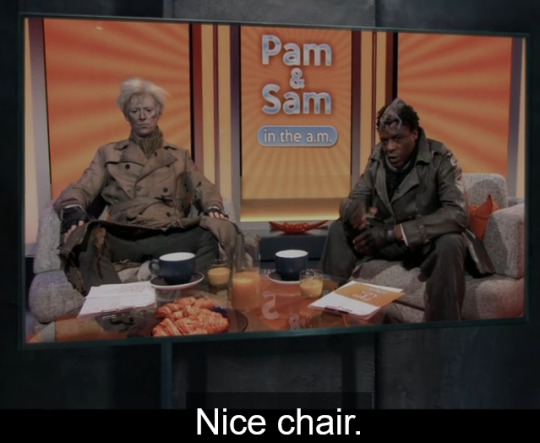
And I think the red tells us one more thing about Crowley, too.
Bright red is the colorest of colors, you know? When we can choose only one color to represent all colors, to represent colorfulness itself, we choose bright red (even in cultures where red symbolizes other meanings than it does in Western art).
Remember how Aziraphale gives Crowley's jacket a tartan collar when he swaps bodies with Crowley and impersonates him in Hell because Aziraphale feels the need to maintain some small secret token of his identity, some tiny unremarked sign of something he loves and thinks is beautiful, when he is down there alone in the gloom among enemies?
Crowley is down there alone among enemies every second of every day and night, whether he's in Hell or on Earth. And he's already had his identity stripped from him once. If you were someone who said
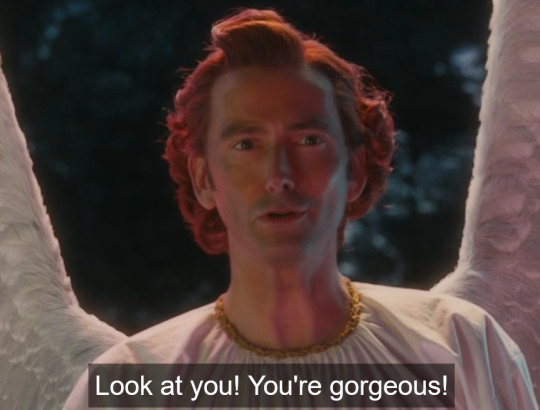
about this

and then you got recruited by the fash downstairs bc the fash upstairs threw you out for not being fashy enough and you had to start wearing nothing but dark colors and more importantly had to hide everything that made you feel warmth or softness or joy, and that was it, that was the deal for eternity, but you could add one (1) little touch to everything you wore to remind yourself that there is some beautiful part of you left, something you loved once, that no one has yet been able to steal or brutalize out of you...what color would the stitching on your gloves be?
Lastly, Yellow represents Crowley to Aziraphale. I'm going to skip the chain of evidence for this bc I think it's obvious, but the way it's used also lends itself to some inferences supported in other areas in the show.
Here's where I think changing Crowley's hair to red from Book Omens' dark is a good decision in another way. Crowley always has red hair, and if he has any color in his clothes it's going to be red. Red is eye-catching; it always stands out, but it doesn't stand out as demonic. And yet the color Aziraphale associates with Crowley and calls "pretty" isn't red.
I suspect that when Aziraphale says he can make Crowley an angel again, Crowley hears "You're not good enough for me to accept you as you are, let me fix you" because these are words Aziraphale has said to him many times, and has meant some of those times. But

tells the audience differently. The color Aziraphale associates with Crowley, the color he calls "pretty," is the color of Crowley's only overtly demonic feature. Aziraphale doesn't love the angel he knew who isn't Crowley, he loves Crowley, the demon, the person he is now, his yellow demon irises.
Yellow appears in three other places in S2, and they're all symbolically significant, and in fact serve to establish another symbolic significance to the color yellow in addition to that of Yellow Is the Color of My True Love's Eyes.
One of them is a feather duster:

Crowley reacts to a feather duster like a cat confronted by an unfamiliar object
The other three are private conversations between Aziraphale and Crowley:

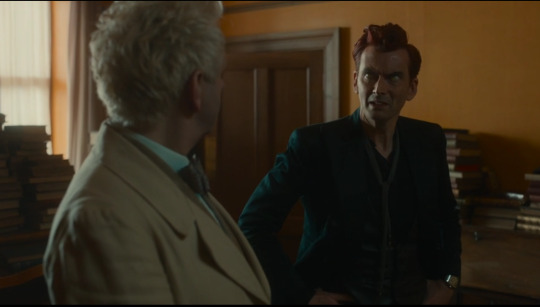

The walls that surround Crowley and Aziraphale when they speak openly about their situation and how they will handle it are drenched in yellow, and that is super interesting, because in Western color symbolism yellow is the color of fear. The archangel of whom Crowley and Aziraphale are both (rightly) terrified wields a tool the color of fear. The color of fear saturates the backdrop of conversations between Aziraphale and Crowley when they have to discuss their situation and their actions openly.
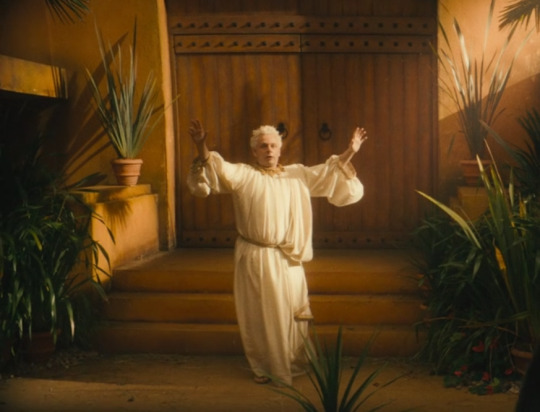
Remember how Aziraphale's voice shakes here?

Crowley realizes the crows have just handed an angel evidence the angel can take to Hell and use to have Crowley killed
Even the Bentley, that clear sign of Aziraphale's love for Crowley, is also a yellow coffin enclosing him. For Aziraphale, thoughts of Crowley are always entangled with fear, because Crowley is not just Crowley, he is also Crowley's Fall.

And I think fear is what Crowley's eyes themselves represent. For Crowley, fear is now a fundamental part of his perception, his nature, his identity.
The angel Aziraphale once knew is not Crowley, and yet from what we've seen, the chiefest difference in character between this sweetheart and this mischief-maker--

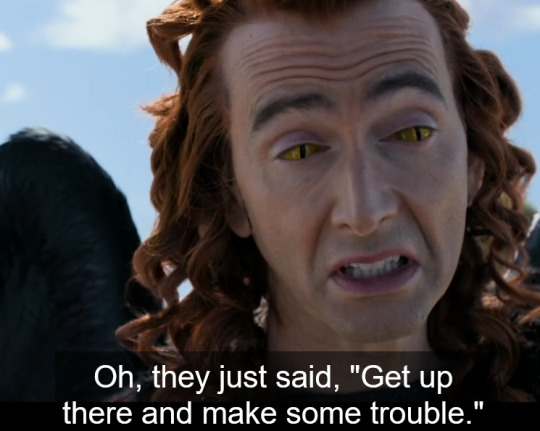
--is that the Starmaker does not know yet that he should be afraid, and the Serpent does. That knowledge and its fear has, shall we say, colored his view of the world.
Aziraphale learns that fear early by observing others rather than Falling himself, and knows enough that by the first time we meet him in the Before, he is already afraid.
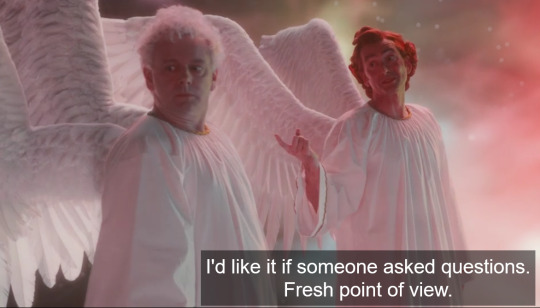
Pink was once symbolically equivalent to red; in modern Western color symbology it is a color of innocence, youth, beauty, and first love. Hashtag just sayin'.
The cruellest thing this suggests to me is that, rather than rebellion or his propensity to ask questions, rather than the knowledge of good and evil, the Starmaker's Fall was caused by his innocence. it wasn't the questions that were the problem: it was that he didn't know any better than to speak them out loud.
Y'all, Crowley and Aziraphale do not suffer from communication problems. Despite both being male-coded and British, they don't even seem to lack emotional intelligence. What they do have is a universe of silence and fear they have to communicate within and around. What they lack is the safety to speak and love freely. The true color of Crowley is crimson, but someone gave him those eyes, and Aziraphale either watched that happen or knew about it, and now Crowley covers himself in black--which btw is also the symbolic color for mystery and secrets--and only lets Aziraphale see him as he really is now, because Aziraphale won't judge him for his yellow eyes (or punish and forsake him for his questions). Because Aziraphale carries that fear with him too.
#good omens#good omens 2#good omens analysis#good omens crowley color analysis#good omens crowley color#crowley#good omens colour analysis good omens crowley colour#good omens colour#good omens meta#angel!crowley#starmaker
1K notes
·
View notes
Text
So I've spent a lot of time untangling Christian exegesis of parables and talking about how the way Christians interpret parables almost always ends up being antisemitic.
But aside from how it makes them think about Jews and Judaism and Jewishness, I also want to talk a bit about how it makes them sympathize more with abusers than with victims.
The easy-to-point-to culprit here is the trilogy of parables that culminates in what most Christians know as the Prodigal Son story.
The common interpretation of these parables is that God does (and therefore Christians should) value a repentant sinner over someone who's never sinned.
The problem here isn't the stories themselves--they're pretty enigmatic as far as their actual meanings--but Luke's gloss:
"Just so, I tell you, there will be more joy in heaven over one sinner who repents than over ninety-nine righteous persons who need no repentance."
(Mark says, "So it is not the will of your Father in heaven that one of these little ones should be lost," which is very different.
So on its face, in 2023, that's a blatantly dangerous, abuser-supporting belief. What is it like to be a child sexually abused by your youth pastor and to hear that the fact that he hurt you is part of what makes him somehow spiritually "better" than you?
And we can see it play out in the way Kevin M. Young, a popular progressive pastor on Twitter (who describes himself as "post-evangelical" and was the senior pastor at a Quaker congregation) responded to being told one of his tweets was antisemitic, and then jumped in to support a woman who responded by identifying herself as a fan of John Chrysostom (the literal author of "Against the Jews" and the most antisemitic of the Church Fathers, which is saying something).

I'm not going to transcribe the whole thing, because it's not all that important for what I have to say about this, but I am going to call out a few lines:
"The American Christian approach to t'shuvah sees the victim's spirit, character, and speech as equally important to the offenders. I.e. in Christendom, the victim can exceed the sin of the offender simply by their reaction (if it be in sin or acted in a way that is not Spirit led)."
So, to be clear, if someone assaults you, and you don't meekly forgive them in a "Spirit led" way, you're somehow worse than they are.
The uniquely Christian brain rot here is in seeing every sin as an opportunity for forgiveness. After all, if being a repentant sinner gives you a higher spiritual status--if there's more "rejoicing in Heaven" over you--than that of your victim, then you have to sin to get there. It treats other people as props in your salvation journey, not as fellow humans whose suffering matters. (Combine that with the Christian idea that suffering is somehow virtuous in and of itself, and you've got a very toxic recipe. Not only, by abusing others, are you guaranteeing your own value as a repentant sinner, but you're giving your victim the opportunity to ennoble themselves through suffering.)
Of course, a key word here is repentant. Put a pin in that.
These sort of exchanges on Twitter--a Christian being outright genocidal toward Jews, and a supposedly progressive Christian figure jumping in to defend the Christian, with seemingly no ability to comprehend that the Jews in the conversation are human beings who may have their own trauma around violently antisemitic language, with boundless empathy for the Christian abuser and none for the Jewish targets of their abuse--happen frequently and just as frequently leave Jwitter baffled in addition to angry.
Why all this empathy for the abuser and none for the victims?
I think a lot of this comes out of progressive Christian exegesis of parables, which is frequently looking for the radical "twist" to the story.
E.g. in the story of the Pharisee and the Tax Collector, the assumption is that the audience of the time would have empathized with the Pharisee, and thus the twist is to make them empathize with the tax collector. In the story of the Good Samaritan, the assumption is that they would have seen the Samaritan as a threat, and the twist is to make him the hero.
The thinking goes that the audience would have had empathy for certain groups and none for others, so the stories push them to feel that empathy for the latter, and that this was needed to balance the scales, to make sure everyone was receiving love and empathy and care.
Except that this, in modernity, has the effect of simply reversing the roles, not balancing them. The groups that are assumed to be in good social standing get no empathy, even become the implicit villains, and the groups (supposedly, since this is now a Christian-dominant society) traditionally looked down on get all of it.
That might still be a balancing act if the "looked down on" groups were actually marginalized. But in the Christian imagination, that role is filled by sinners in need of Christian grace, not necessarily demographically marginalized groups.
The idea seems to be that the victims are getting sympathy from elsewhere, so it's the Christian's job to make sure the abuser/sinner gets sympathy too.
But I'll point again to that pesky word "repentant."
Ultimately, when it comes to treatment of Jews and Muslims and anyone else who points out that a Christian has in some way harmed them, Christian sympathy goes immediately to the offender before the offender has even expressed any repentance.
The repentant sinner is so much more valuable, at this point, than their victims that they must be preemptively forgiven, that they are more valuable purely because they now have the potential to repent.
And this seems to be lurking under not just how "progressive" pastors act on Twitter, but in a lot of our cultural narratives around, say, college rapists and their futures, around white people who are publicly called out for racist acts, etc.
731 notes
·
View notes
Text

ANTISEMITIC BIAS
Many antisemites don’t consciously dislike Jews. They might even think highly of Jews. For example, they might believe “positive” stereotypes of Jews, such as that Jews are good at business or good with money. They might have Jewish friends. They might like “some” Jews. But they still cause tremendous damage to the Jewish community.
“Biases” can be defined as “an inclination or prejudice for or against one person or group.”
Unconscious biases are known as implicit biases. We all have implicit biases (whether negative or positive) in the way that we interpret the world around us. Conscious biases (such as, for example, the Nazis outwardly believing that Jews were “the inferior race”) are known as explicit biases.
Because antisemitism is everywhere in our world — in our cultures, our languages, our folklore, our literature, our entertainment, our media, and more — it’s impossible for us not to internalize at least some antisemitic biases. These biases, however, exist on a spectrum: from unconsciously assuming that most Jews are wealthy (implicit bias) to believing the white supremacist conspiracy theory that Jews are enacting a “white genocide” (explicit bias) to everything in between.
Because antisemitism is so old and so deeply embedded into our society and institutions (e.g. religion, language, literature, education, and more), that means that there is a lot of antisemitic bias in our world, most of which you might not even be able to see. But that doesn’t mean it doesn’t exist.
ANTISEMITISM IS A CONSPIRACY ABOUT THE JEWS
Antisemitism can be tricky to spot because it works very differently than every other form of bigotry. While other bigotries see their victims as “inferior,” antisemitism sees Jews as both “inferior” but also “superior” or all-powerful, capable of causing every calamity from wars to natural disasters to diseases to controlling the weather.
Societies project whatever they dislike most onto the Jews. In the Middle Ages, Jews were Christ-killers. In Nazi Germany and McCarthyist America, Jews were communists. In the Soviet Union, Jews were capitalists. In Nazi Germany and during the rise of the scientific racism period, Jews were the inferior race. To white supremacists, Jews are not white. To left-wing anti-Zionists, Jews are white. For centuries in Europe, Jews were untrustworthy foreigners from Palestine. But today among anti-Zionists, Jews are Europeans colonizing Palestine. We are whatever makes us the perfect scapegoat at any given time.
It’s no coincidence, then, that antisemitism tends to surge most when societies are in upheaval. After all, the leaders need someone to blame. Examples of this include the Germans’ blaming Jews for Germany’s suffering post-World War I, as well as the rise of the “Deadly Exchange” conspiracy which blames Israel for police brutality in the United States, following George Floyd’s murder.
Antisemitism moves through conspiracy theories. Most notably, since to the antisemite, Jews are all-powerful, the most prevalent and deeply ingrained antisemitic conspiracies have to do with Jews and wealth and power. In the Middle Ages, for example, Europeans believed that Jews aimed to subvert Christendom. Since the 1920s, antisemitic leaders in the Arab world have rallied their followers behind the conspiracy that Jews intend to destroy Al-Aqsa Mosque and usurp Islamic lands. White supremacists — and far left anti-Zionists — today believe the “Zionist Occupied Government” conspiracy, which accuses Jews of controlling and manipulating the American government for their benefit.
Given the pervasiveness of conspiracies regarding Jews and power, antisemitism is nearly impossible to address without triggering more antisemitism. If an antisemite faces consequences for their actions, antisemites will use this as “proof” that it’s the all-powerful Jews that have imposed these consequences. This makes antisemitism a self-fulfilling prophecy.
BIGOTRY WON'T ALWAYS BE OBVIOUS TO YOU
Most of us want to do the right thing. The problem is that bigotry — whether antisemitism or something else — doesn’t come with a flashing neon sign that says “this is bigoted! Call it out!” Instead, bigotry persists because entire societies convince themselves that their bigoted worldview is somehow justified. This is especially true of antisemitism. Antisemites throughout history have long persecuted Jews under the guise of seeking justice.
For instance, since the Middle Ages, Jews have been periodically persecuted on the accusation that they killed a Christian or Muslim child for ritual purposes. In other words, antisemites were seeking “justice” for these children that the Jews allegedly killed. This antisemitic trope is called “blood libel” and has led to the deaths of millions of Jews. It’s safe to say that these murderous antisemites fully believed that they were doing the “right thing.” Some examples of historic blood libels that have resulted in violence against Jews include the William of Norwich blood libel (1144), the Damascus Affair (1840), and the Kielce Pogrom (1946).
During the Bubonic Plague, Jews were persecuted under the false accusation that they were “poisoning the wells” and sickening the gentile population of Europe. Once again, the persecution of Jews was seen as just.
During the Nuremberg Trials, high-ranking Nazi officers testified that they believed that Jews were a danger to the safety of the German people and the German nation. In other words, they justified their mass extermination of Jew under the guise of “protecting” the people of Germany.
The list goes on and on. Is it possible that today you too have been made to believe that violence against Jews — Zionists, Israelis — is a just cause?
THE NAZI FALLACY
A few years ago, the notorious antisemite Shaun King argued with a Holocaust survivor on Twitter. When accused of antisemitism, he retorted, “I can’t be an antisemite. I fight Nazis every day!” But anyone even remotely familiar with antisemitism or Jewish history will know that Nazis were far from the Jews’ only historic oppressors. You don’t have to be a Nazi to be an antisemite. In fact, most antisemites are not Nazis.Not even close.
Nazism is just one manifestation of antisemitism. It’s a deadly one, certainly, but it’s also far from the only deadly manifestation of antisemitism. Jews have been killed by the thousands — sometimes by the millions — by a multitude of other oppressors. Some, like the Nazis, the KKK, and other white supremacists, are far-right. Others, like the Soviet Union, are far-left. Others are somewhere in the middle, and others oppressed us so long ago that their ideologies long predate the left-right political spectrum as we know it today.
The horrific images of Nazism and the death camps are seared in the world’s collective memory. It’s easy to think that if it doesn’t look like Nazism, if it doesn’t look like Auschwitz, then it’s not actually antisemitism, or perhaps it could be antisemitism, but it’s not serious antisemitism. In reality, though, antisemitism doesn’t go from zero to Auschwitz. Instead, antisemitic tropes, conspiracies, and stereotypes fester and proliferate, operating under new euphemisms and adapting to whatever society they’re in. Many of the same antisemitic conspiracies that drove the Nazis nearly 100 years ago are the exact same conspiracies that are driving “protestors” to violently harass Jews in the streets of New York City today.
For many years before the gas chambers, antisemitism in Germany, which once was home to the most assimilated, well-integrated Jewish community in the Diaspora, proliferated in university lecture halls, justified and explained away in academic language. It wasn’t deadly yet, but it soon would be. When you dismiss any sort of antisemitic rhetoric because it doesn’t mirror the deadliest days of the Nazi regime, what you are actually doing is that you are contributing to the sort of hostile, conspiratorial environment that eventually made the Holocaust possible in the first place.
THE GASLIGHTING
Antisemitism and the gaslighting of Jews go hand in hand. If an antisemite faces consequences for their antisemitism, it simply reinforces their antisemitic beliefs. Because antisemitism always places Jews in the role of oppressor, it’s nearly impossible for Jews to seek accountability or justice without being accused of exaggerating, crying wolf, playing the victim, or otherwise having nefarious intentions.
After the Holocaust, for example, the second in command at the Red Cross, Carl Jacob Burckhardt, decried the Nuremberg Trials, calling them “Jewish revenge.” Others, like the Palestinian newspaper Falastin, did so as well.
Antisemitic bias oftentimes makes it impossible for some people to see Jews as victims. If an antisemite loses their job for espousing antisemitism, they will then blame the “powerful” Jews — or Zionists, or another euphemism — for taking their job. In that way, they turn the victim into the victimizer. This is a classic gaslighting tactic, which creates a catch-22 and is one of the reasons antisemitism can be so hard to combat.
For example, in the lead up to the Holocaust, American isolationists of various political persuasions accused Jews sounding the alarm on the treatment of Jews in Nazi Germany of trying to instigate a war with the Germans.
Sometimes we are even accused of provoking or exaggerating antisemitism for our own benefit. There are a number of conspiracies, for example, that the Zionists worked with the Nazis to instigate the Holocaust to justify the creation of a Jewish state.
An example of the accusation that Jews play the victim is when we are told that we talk about the Holocaust “too much” — contrary to the statistics that demonstrate people are woefully misinformed about the Holocaust — or that we should move on because we “got reparations” (not exactly true, but that’s a different topic).
Then there are the accusations that we brought antisemitism or antisemitic violence onto ourselves — something that we’ve seen on a grand scale following the Hamas massacre on October 7.
WHAT YOU CAN DO
(1) Listen to Jews. I don’t mean just listen to your Jewish friends, or to the Jews you personally agree with. I mean listen to the Jewish community as a whole. Jews don’t often agree on much, but at the end of the day, we are a community, and only the Jewish community can fully describe our own experience.
Don’t listen just to the Jews who validate your views. Listen to the Jews that challenge you. Don’t shut yourself off from learning because it might contradict whatever ideology you follow. Learning is a lifelong process. I promise you you don’t know everything there is to know about antisemitism (I don’t either! I’m always learning). But it’s your responsibility to open yourself up to new information so that you can do better.
(2) if Jews are telling you something is antisemitic, then your first instinct should never be to distrust us.Can Jews weaponize accusations of antisemitism? Sure. Anyone can weaponize anything. Is it likely that that’s what’s happening? No. Antisemitism worldwide has skyrocketed to the highest levels since the end of the Holocaust. It’s a very real threat taking lives. You should take accusations of antisemitism just as seriously as you take accusations of other bigotries…even if initially you don’t see it.
(3) I can’t stress this enough: do your best to educate yourself about antisemitic conspiracies, stereotypes, and tropes throughout history. The euphemisms may change — sometimes we’re “globalists,” other times we’re “Zionists” — but the formula remains the same. To be able to spot antisemitism, you have to learn to spot it. I recommend reading my post “The World’s Oldest Hatred” for more.
Instagram
175 notes
·
View notes
Text

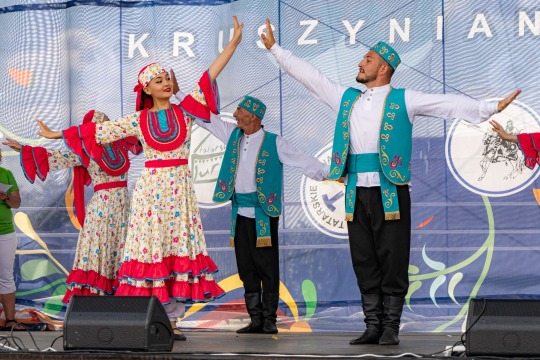
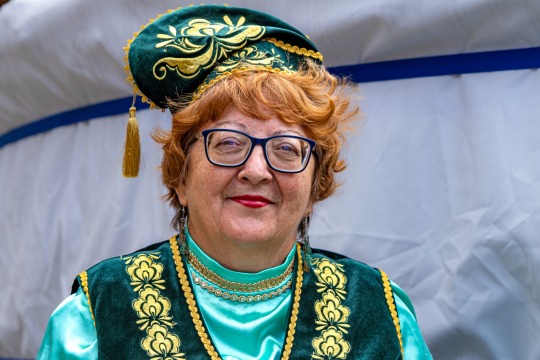
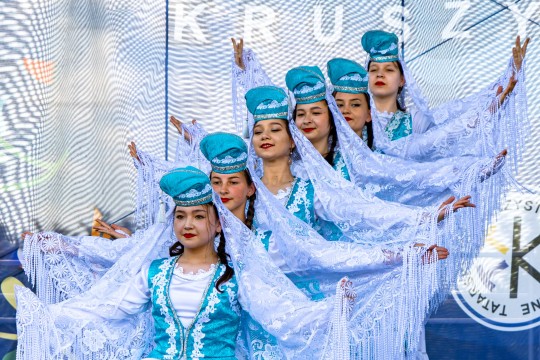
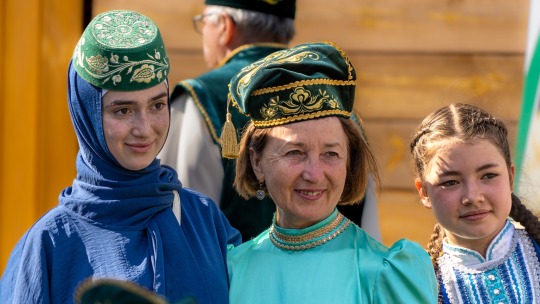
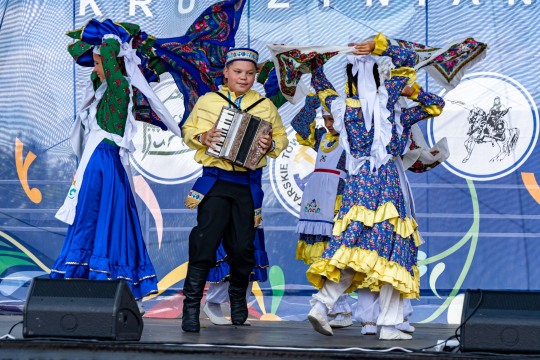
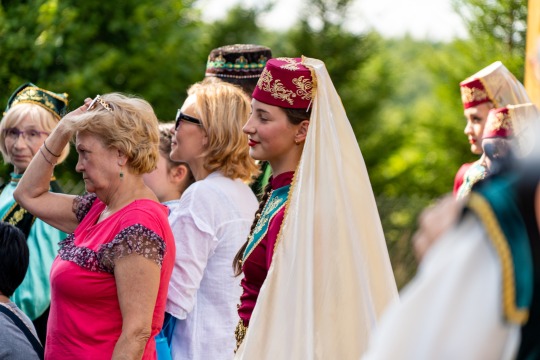
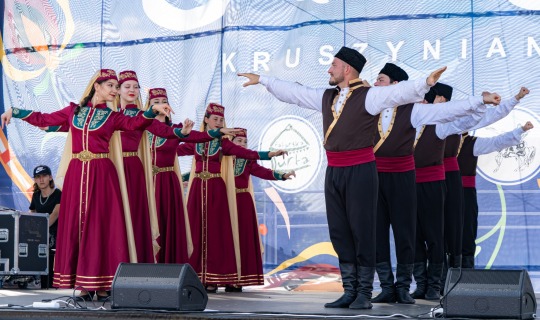
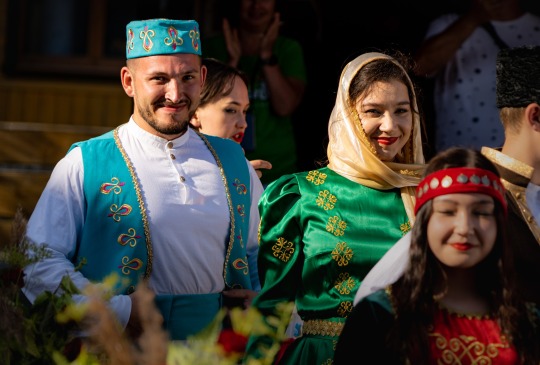
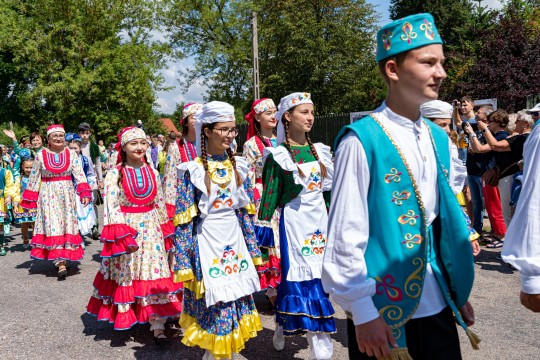
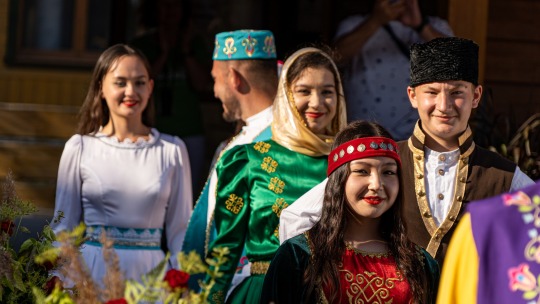
Poland's Muslim Lipka Tatars
Lipka Tatars are Poland's only remaining Indigenous Islamic group. Many of the Polish Tatars belonged to the Polish nobility historically and through out history have been one of the most loyal groups to the Polish state; also having had an influence on the general Polish culture.
Noted for their skills in archery and horse riding, they have been viewed as some of Poland's greatest warriors in the past. Their combat was essential in Poland's victory over the Ottoman Empire during the Battle of Vienna. This fact is contrary to recent western nationalist propaganda, stating that the war was a battle between Christendom and the Islamic world, rather than a war of imperialism. After the war King Jan Sobieski III granted the Lipka Tatars large pieces of land in the Podlasie region of Eastern Poland.
Their origins are in predominately male Crimean Tatars and other settlers from the Golden Horde, who relied on intermarriage with Christian women, leading to early partial assimilation and adoption of Slavic languages. However, they were able to keep their identity and parts of their culture through their ties to Islam. Regardless, over the centuries more and more Tatars were absorbed into the Polish-Lithuanian Common wealth's Catholic and Orthodox populations, with estimates in the 18th century stating that up to 25% of Muslims converted to Christianity- partially motivated by violent peasant drawback due to the privileges bestowed onto them. Eventually this absorption reached its height during the inter-war and post-World War II period of Poland, in part due to assimilative policies. These days most Lipka Tatar descedants simply identify as ethnic Poles, with many Poles not aware of their ancestry. A prominent example of this is Polish-American personality Martha Stewart who only recently discovered that she is of partial Lipka Tatar ancestry, after partaking in a television program dedicated to geneaology.
148 notes
·
View notes
Text
The plain fact is that whatever Homer or Aeschylus might have had to say about the Persians or Asia, it simply is not a reflection of a ‘West’ or of ‘Europe’ as a civilizational entity, in a recognizably modern sense, and no modern discourse can be traced back to that origin, because the civilizational map and geographical imagination of Antiquity were fundamentally different from those that came to be fabricated in post-Renaissance Europe.
[...] It is also simply the case that the kind of essentializing procedure which Said associates exclusively with ‘the West’ is by no means a trait of the European alone; any number of Muslims routinely draw epistemological and ontological distinctions between East and West, the Islamicate and Christendom, and when Ayatollah Khomeini did it he hardly did so from an Orientalist position. And of course, it is common practice among many circles in India to posit Hindu spirituality against Western materialism, not to speak of Muslim barbarity. Nor is it possible to read the Mahabharata or the dharmshastras without being struck by the severity with which the dasyus and the shudras and the women are constantly being made into the dangerous, inferiorized Others. This is no mere polemical matter, either. What I am suggesting is that there have historically been all sorts of processes – connected with class and gender, ethnicity and religion, xenophobia and bigotry – which have unfortunately been at work in all human societies, both European and non-European. What gave European forms of these prejudices their special force in history, with devastating consequences for the actual lives of countless millions and expressed ideologically in full-blown Eurocentric racisms, was not some transhistorical process of ontological obsession and falsity – some gathering of unique force in domains of discourse – but, quite specifically, the power of colonial capitalism, which then gave rise to other sorts of powers. Within the realm of discourse over the past two hundred years, though, the relationship between the Brahminical and the Islamic high textualities, the Orientalist knowledges of these textualities, and their modern reproductions in Western as well as non-Western countries have produced such a wilderness of mirrors that we need the most incisive of operations, the most delicate of dialectics, to disaggregate these densities.
Aijaz Ahmed, In Theory: Nations, Literatures, Classes
632 notes
·
View notes
Text
European history is not white


Someone commented this to a post I reblogged, which message is basically "we shouldn't venerate the Dead White Man HistoryTM and we should elevate other history too, but we still need to learn Dead White Man HistoryTM to understand the world today". It's basically a response to the attitude you sometimes come across in the internet that sees learning about those Dead White MenTM as not worth our time. And this person, who seems to be following this blog because they responded to my reblog, takes it as a personal attack against all white Europeans. For some reason. Well I take these comments as a personal attack against historical understanding.
Firstly, the post clearly didn't say you shouldn't venerate any European history, because not all European history is Dead White Man HistoryTM. Obviously this person thinks European history is white, which is not true, but surely, surely, they know it's not all men? Secondly, what is "west culture"? When did it start? There is not one western culture, not one European culture. The first concept of some shared Europeanness was the Christendom in Middle Ages, but it was not exactly the same as we think of Europe today, because it did not include the pagan areas, but it included a lot of Levant and parts of Central Asia, where there were large Christian areas. And Europe was not "very white" nor was the Christendom. The more modern concept of West was cooked in tandem with race and whiteness during colonial era and Enlightenment, around 17th to 18th centuries. And Europe was certainly not very white then. The western world also includes a lot of colonized areas, so that's obviously not white history. Thirdly, implying that asking white people to apologize for European history (which no one did ask) is as ridiculous as asking black people for African history is... a choice. Black people do exist in a lot of other places than Africa, which white people should be the ones apologizing for, and really white people also have a lot to answer for about African history. Lastly, if you think the quote "anyone who thinks those dead white guys are aspirational is a white supremacist" means you as an European are demanded to apologize for your existence, maybe - as we say in Finland - that dog yelps, which the stick clanks. (I'm sorry I think I'm the funniest person in the world when I poorly translate Finnish sayings into English.)
The thing is, there is no point in European history, when Europe was white, for three reasons. 1) Whiteness was invented in 17th century and is an arbitrary concept that has changed it's meaning through time. 2) Whichever standard you use, historical or current, Europe still has never been all or overwhelmingly white, because whiteness is defined as the in-group of colonialists, and there has always been the internal Other too. In fact the racial hierarchy requires an internal Other. 3) People have always moved around a lot. The Eurasian steppe and the Mediterranean Sea have always been very important routes of migration and trade. I've been meaning to make a post proving exactly that to people like this, since as I've gathered my collection of primary images of clothing, I've also gathered quite a lot of European primary images showing non-white people, so I will use this opportunity to write that post.
So let's start from the beginning. Were the original inhabitants of Europe white? Of course not. The original humans had dark skin so obviously first Europeans had dark skin. Whenever new DNA evidence of dark skinned early Europeans come out (like this study), the inevitable right-wing backlash that follows is so interesting to me. Like what did you think? Do you still believe the racist 17th century theories that white people and people of colour are literally different species? I'm sure these people will implode when they learn that studies (e.g. this) suggest in fact only 10 000 years ago Europeans had dark skin, and even just 5 000 years ago, when Egypt (an many others) was already doing it's civilization thing, Europeans had brown skin (another source). According to the widely accepted theory, around that time 5 000 years ago the Proto-Indo-European language developed in the Pontic-Caspian steppe, which extends from Eastern Europe to Central Asia. These Proto-Indo-Europeans first migrated to Anatolia and then to Europe and Asia. Were they white? Well, they were probably not light skinned (probably had brown skin like the other people living in Europe around that time), the Asian branch of Indo-European peoples (Persians, most Afghans, Bengalis, most Indians, etc.) are certainly not considered white today and a lot of the people today living in that area are Turkic and Mongolic people, who are also not considered white. I think this highlights how nonsensical the concept of race is, but I don't think Proto-Indo-Europeans would have been considered white with any standard.
Around Bronze Age light skin became common among the people in Europe, while in East Asia it had become wide spread earlier. This does not however mark the point when "Europe became white". During the Bronze Age there was a lot of migration back and forth in the Eurasian steppe, and the early civilizations around Mediterranean did a lot of trade between Europe, Africa and Asia, which always means also people settling in different places to establish trading posts and intermarrying. There were several imperial powers that also stretched to multiple continents, like the briefly lived Macedonian Empire that stretched from Greece to Himalayas and Phoenicians from Levant, who didn't built an empire but settled in North Africa, Sicily and Iberia. In Iron Age the Carthaginian Empire, descendants of Phoenician settlers in current Tunisia, build an Empire that spanned most of the western Mediterranean coast. Their army occupying that area included among others Italic people, Gauls, Britons, Greeks and Amazigh people.
Iron Age also of course saw the rise of the Roman Republic, and later empire, but it was preceded by Etruscans, who populated Tuscan, and possibly preceded the Indo-European presence. However, weather through trade and migration with other Mediterraneans or the continuing presence of darker skin tones of the early Europeans, their art quite often depicts darker skin tones too, like seen below in first two images. Roman Empire at it's height spanned from Babylonia to the British Isles. They recruited soldiers from all provinces and intentionally used stationed them in different areas so they wouldn't be too sympathetic to possible rebels or neighboring enemies. Historical sources mention black Nubian soldiers in British Isles for example. They also built a lot of infrastructure around the empire to ensure protection and easy transportation through trade routes inside the empire. During this time Jewish groups also migrated from Levant to both North-Africa and Europe. Rome even had non-European emperors, like Septimius Severus who originated from Levant and was Punic (descendants of Phoenicians) from his father's side, and who was depicted with darker skin (third picture below). Various ethnicities with differing skin tones are represented all over Roman art, like in the fourth picture below from hunting lodge in Sicily.

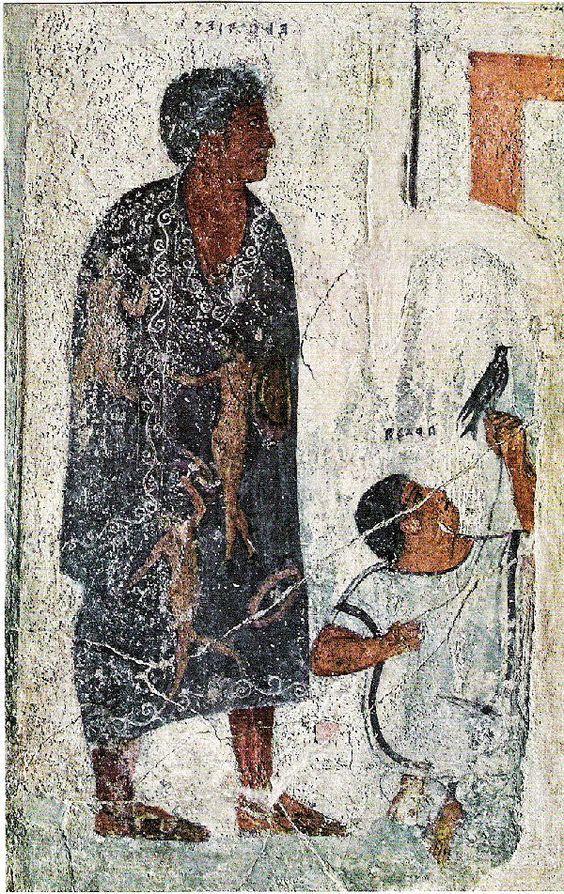
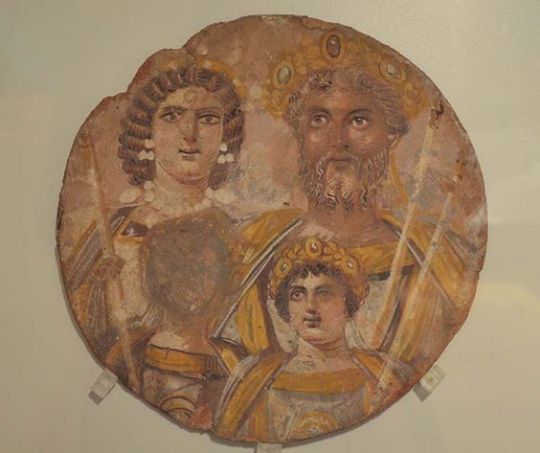

Eurasian steppe continued to be important source of migration and trade between Europe and Asia. Scythians, Iranic nomadic people, were important for facilitating the trade between East Asia and Europe through the silk road during the Iron Age. They controlled large parts of Eastern Europe ruling over Slavic people and later assimilating to the various Slavic groups after loosing their political standing. Other Iranic steppe nomads, connected to Scythian culture also populated the Eurasian steppe during and after Scythia. During the Migration Period, which happened around and after the time of Western Rome, even more different groups migrated to Europe through the steppe. Huns arrived from east to the Volga region by mid-4th century, and they likely came from the eastern parts of the steppe from Mongolian area. Their origins are unclear and they were either Mongolic, Turkic or Iranic origin, possibly some mix of them. Primary descriptions of them suggests facial features common in East Asia. They were possibly the nomadic steppe people known as Xiongnu in China, which was significant in East and Central Asia from 3rd century BCE to 2nd century CE until they moved towards west. Between 4th and 6th centuries they dominated Eastern and Central Europe and raided Roman Empire contributing to the fall of Western Rome.
After disintegration of the Hun Empire, the Huns assimilated likely to the Turkic arrivals of the second wave of the Migration Period. Turkic people originate likely in southern Siberia and in later Migration period they controlled much of the Eurasian steppe and migrated to Eastern Europe too. A Turkic Avar Khagenate (nation led by a khan) controlled much of Eastern Europe from 6th to 8th century until they were assimilated to the conquering Franks and Bulgars (another Turkic people). The Bulgars established the Bulgarian Empire, which lasted from 7th to 11th in the Balkans. The Bulgars eventually adopted the language and culture of the local Southern Slavic people. The second wave of Migration Period also saw the Moor conquest of Iberia and Sicily. Moors were not a single ethnic group but Arab and various Amazigh Muslims. Their presence in the Iberian peninsula lasted from 8th to 15th century and they controlled Sicily from 9th to 11th century until the Norman conquest. During the Norman rule though, the various religious and ethnic groups (which also included Greeks and Italic people) continued to live in relative harmony and the North-African Muslim presence continued till 13th century. Let's be clear that the Northern Europe was also not white. Vikings also got their hands into the second wave migration action and traveled widely to east and west. Viking crews were not exclusively Scandinavians, but recruited along their travels various other people, as DNA evidence proves. They also traded with Byzantium (when they weren't raiding it) and Turkic people, intermarried and bought slaves, some of which were not white or European. A Muslim traveler even wrote one of the most important accounts of Vikings when encountering them in Volga.
By this point it should already be clear that Medieval Europe was neither white, but there's more. Romani people, who originate from India and speak Indo-Aryan language, arrived around 12th century to Balkans. They continued to migrate through Europe, by 14th century they were in Italy, by 15th century in Germany and by 16h century in Britain and Sweden. Another wave of Romani migration from Persia through North-Africa, arrived in Europe around 15th century. Then there's the Mongol Empire. In 13th century they ruled very briefly a massive portion of the whole Eurasian continent, including the Eastern Europe. After reaching it's largest extent, it quickly disintegrated. The Eurasian Steppe became the Golden Horde, but lost most of the Eastern-Europe, except Pontic-Caspian Steppe. They ruled over Slavs, Circissians, Turkic groups and Finno-Ugric groups till early 15th century. The Mongolian rulers assimilated to the Turkic people, who had been the previous rulers in most of the steppe. These Turkic people of the Golden Horde came to be known as Tatars. Golden Horde eventually split into several Tatar khagenates in 15th century, when the khagenates, except the Crimean Khagenate, were conquered by the Tsardom of Moscovy. Crimean Khagenate was annexed by the Russian Empire in 1783. Crusades were a movement from Europe to Levant, but they also meant intermarriage in the the Crusader kingdoms especially between the European and Levant Christians, and some movement back and froth between these kingdoms and Europe, trade and a lot of movement back after the Crusader kingdoms were defeated in 13th century. Generally too trade across the Mediterranean sea was extensive and led to migration and intermarriage.
And here's some example of people of colour in Medieval European art, shown as part of the majority white European societies. First is from a 15th century French manuscript depicting Burgundy court with dark skin courtier and lady in waiting. Second one is from a Flemish manuscript from 15th century of courtiers, including a black courtier, going for a hunt. Third is a 15th century Venetian gondolier with dark skin.

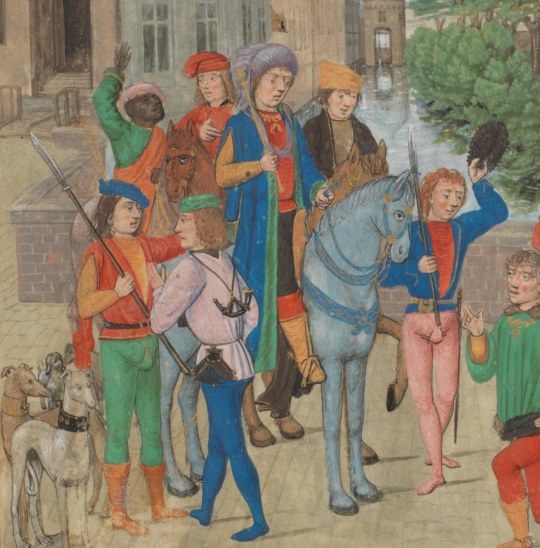
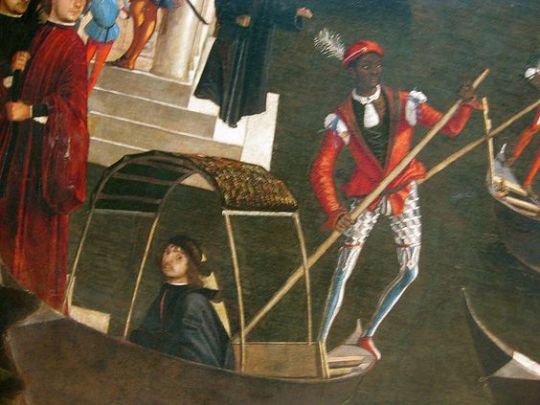
In Renaissance Era Europe was only increasing it's trade and therefore had even more connections outside Europe. The first picture below is Lisbon, which had strong trade relationship with Africa, depicted in late 16th century. People with darker skin tones were part all classes. Second image is an Italian portrait of probably a seamstress from 16th century. Third one is a portrait of one of the personal guards of the Holy Roman Emperor. Fourth image is a portrait of Alessandro de' Medici, duke of Florence, who was noted for his brown complexion, and the modern scholarly theory is that his mother was a (likely brown) Italian peasant woman.
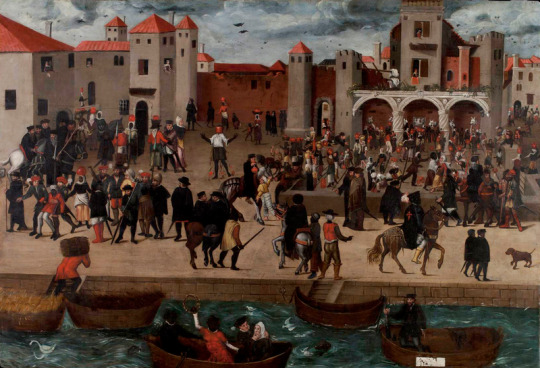
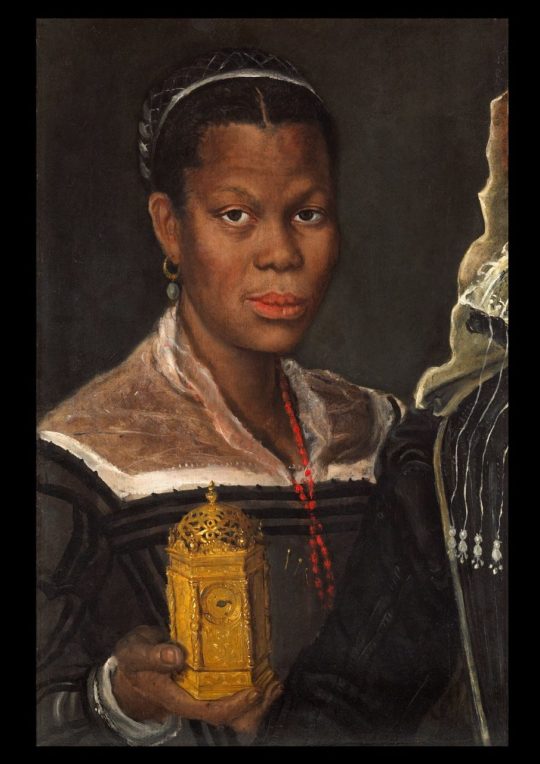
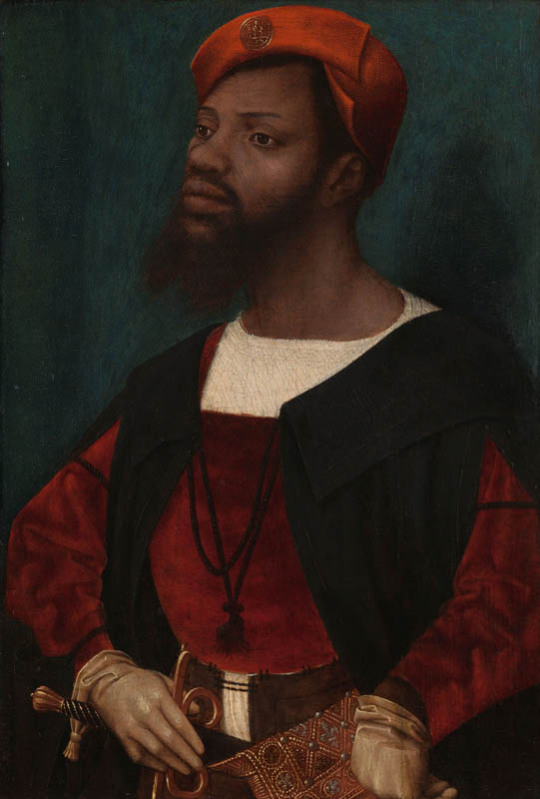

Colonialism begun in the Renaissance Era, but the wide spread colonial extraction and slavery really got going in the 17th century. Racial hierarchy was developed initially to justify the trans-Atlantic slave trade specifically. That's why the early racial essentialism was mostly focused on establishing differences between white Europeans and black Africans. Whiteness was the default, many theories believed humans were originally white and non-whites "degenerated" either through their lives (some believed dark skin was basically a tan or a desease and that everyone was born white) or through history. Originally white people included West-Asians, some Central-Asians, some North-Africans and even sometimes Indigenous Americans in addition to Europeans. The category of white inevitably shrank as more justifications for atrocities of the ever expanding colonial exploitation were required. The colonial exploitation facilitated development of capitalism and the industrial revolution, which led to extreme class inequality and worsening poverty in the European colonial powers. This eventually became an issue for the beneficiaries of colonialism as worker movements and socialism were suddenly very appealing to the working class.
So what did the ruling classes do? Shrink whiteness and give white working classes and middle classes justifications to oppress others. Jews and Roma people had long been common scapegoats and targets of oppression. Their oppression was updated to the modern era and racial categories were built for that purpose. The colonial powers had practiced in their own neighborhoods before starting their colonial projects in earnest and many of those European proto-colonies were developed to the modern colonial model and justified the same way. In 19th century, when racial pseudoscience was reaching it's peak, Slavs, others in Balkan, the Irish (more broadly Celts), Sámi (who had lost their white card very early), Finns, Southern Italians, the Spanish, the Southern French and Greeks all were considered at least not fully white. The Southern Europeans and many Slavs were not even colonized (at least in the modern sense, though with some cases like Greeks it's more complicated than that), but they looked too much and were culturally too similar to other non-white Mediterraneans, and they were generally quite poor. In many of these cases, like Italians, the French and Slavs, it was primarily others belonging in the same group, who were making them into second class citizens. All this is to highlight how very malleable the concept of race is and that it's not at all easy to define the race of historical people.
However, even if we would go with the racial categories of today, Europe was still far from being all white in this period. You had Roma, who certainly are not included in whiteness today, and European Jews, whose whiteness is very conditional, descendants of Moors in Southern Europe and Tatars and Turks in Eastern Europe and Turkey, which today is often not thought of as part of Europe, but historically certainly was. And then colonialism brought even more people into Europe forcibly, in search of work because their home was destroyed or for diplomatic and business reasons. There were then even more people of colour, but they were more segregated from the white society. Black slaves and servants are very much represented in European art from 17th century onward, but these were not the only roles non-white people in Europe were in, which I will use these examples to show. First is a Flemish portrait of Congo's Emissary, Dom Miguel de Castro, 1643. Second is a 1650 portrait of a Moorish Spanish man Juan de Pareja, who was enslaved by the artist as artisanal assistant, but was freed and became a successful artist himself. Third is a 1768 portrait of Ignatius Sancho, a British-African writer and abolitionist, who had escaped slavery as a 20-year-old. Fourth painting is from 1778 of Dido Elizabeth Belle, a British gentlewoman born to a slave mother who was recognized as a legitimate daughter by her father, and her cousin. The fifth portrait is of an unknown woman by (probably) a Swiss painter from late 18th century. Sixth is a 1760s Italian portrait of a young black man.

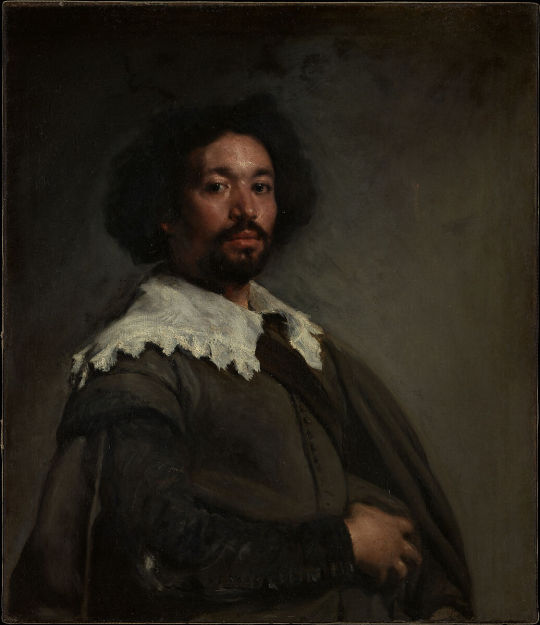
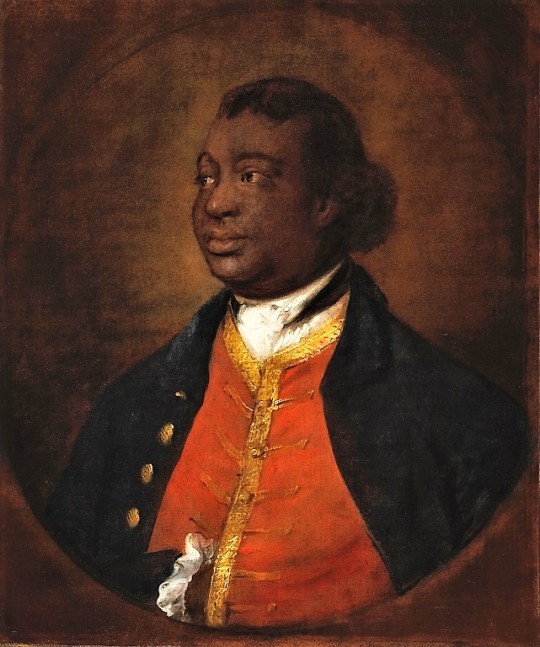
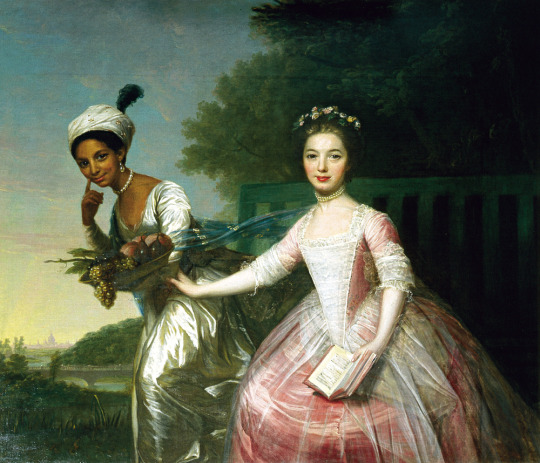
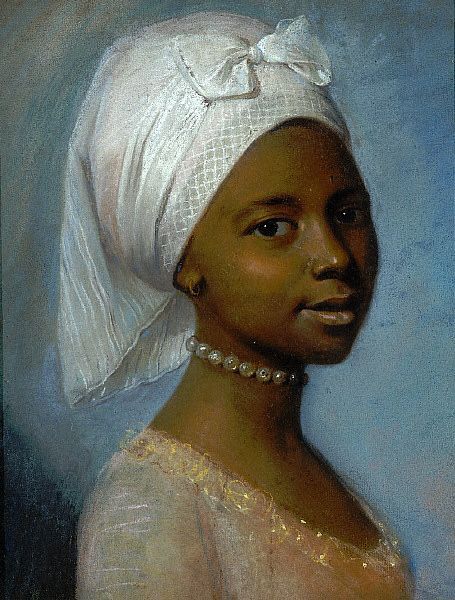
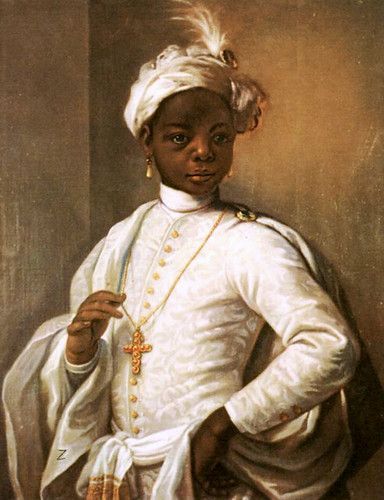
In late 18th century England abolished slavery in British Isles first, then in early 19th century in the whole British Empire, thanks to the continuous campaign of free Black people and some white allies, notably Quakers. Around the same time slavery was abolished in France (briefly till Napoleon got to power) after the French revolution. This meant there were a lot more free black people in Europe after that. In 18th century the Europeans, British especially, were colonizing Asia as much they could, which meant that in 19th century there started to also be a lot more Asian, especially Indian people in Europe. First picture below is of Thomas Alexander Dumas, who was son of a black slave woman and a white noble French man and became a general in the French revolutionary army. His son was one of the most well-known French authors, Alexander Dumas, who wrote The Count of Monte Cristo and The Three Musketeers. Second portrait is of Jean-Baptiste Belley, a Senegalese former slave, who became French revolutionary politician. Third portrait is from 1810 of Dean Mahomed, an Indian-British entrepreneur, who established the first Indian restaurant in London. Forth is Arab-Javanese Romantic painter Saleh Syarif Bustaman, who spend years in Europe. Fifth is a 1862 photo of Sara Forbes Bonnetta, originally named Aina, princess of Edbago clan of Yoruba, who was captured into slavery as a child, but later freed and made Queen Victoria's ward and goddaughter. She married a Nigerian businessman, naval officer and statesman, James Pinson Labulo Davies (sixth picture).
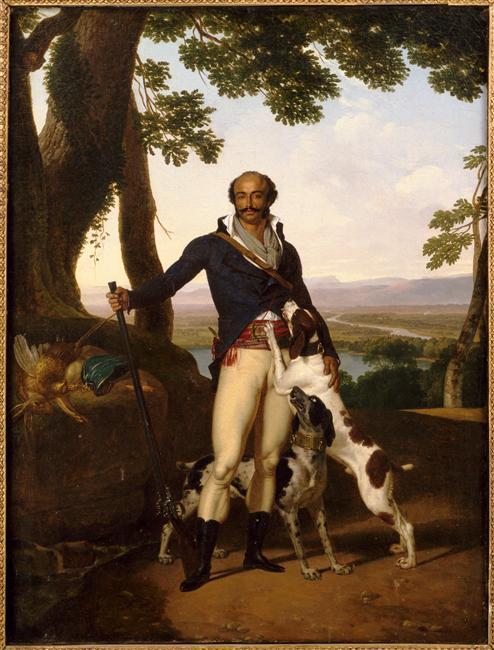


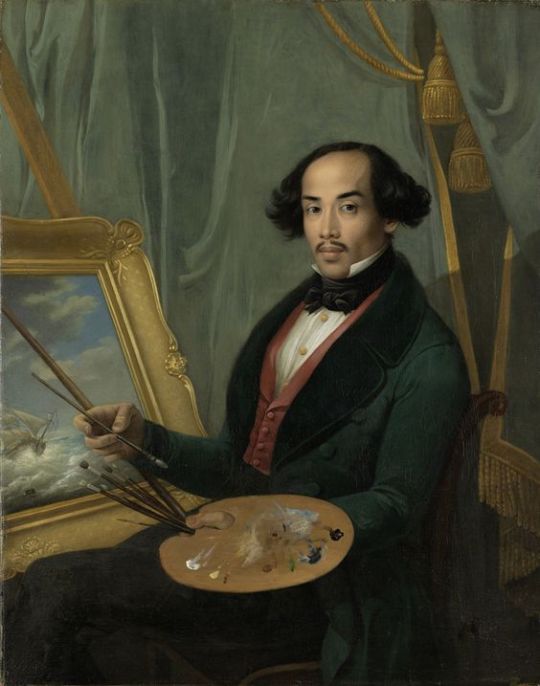
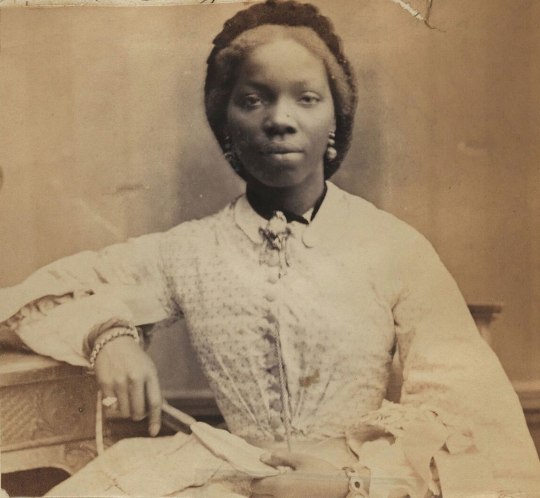
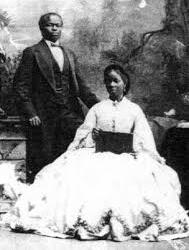
So any guesses on at what point was that "very white Europe" when the "west culture" begun? It kinda seems to me that it never actually existed.
#history#poc history#black history#historical art#european history#history of race#colonialism#racism#slavery#painting#photograph
192 notes
·
View notes
Note
Recently on a post about Westerns, you mentioned that the word "damn' wasn't actually used all that much back then. This fascinates me. How DID cursing work in the Old West?
I was probably talking about Deadwood!
Deadwood is, by and large, a very historically accurate show. Off the top of my head, I cannot think of a show that's more accurate, it might even be more accurate than any movie I've seen. The way people talk to each other, the way racial politics work, the way people moved with and against the government. I do not ever ever ever ever and I am not starting now, recommend people watch a work of fiction to learn anything ACCURATE about history, and even in Deadwood, do not assume you know fucking ANYTHING about Seth Bullock or Al Swearengen from the show. But. As far as "The way the American West looked and worked" if you are bound and determined to get it from an entertainment, Deadwood is it.
But.
The creator has talked a lot about how when you make a show, you have to make CHOICES, and those choices affect how the audience sees the work, and are necessarily influenced by the time in which they themselves live.
Historical translation is as much an art as language translation. I've talked about this with movies all the time, how very often female characters are changed to be what we would consider "hot" (But male ones as well. Just more glaring in female characters) and it deeply reflects the time in which the piece is made, which is why we have Keira Knightly running around looking like a fucking 90s bohemian Wet Seal shopper in Pride and Prejudice*. But language is an aspect of that, as well, and one that I do also sometimes talk about, and one that the show creator talked about a lot.
People in the American West would not say fuck NEARLY as it is used in Deadwood. This is not to say it was never never uttered but it was much much much more taboo than it is currently. It was about the frequency with which the average American would say "cunt" in from of her grandmother.
Swearing was very common in rough camps like Deadwood, but it did not sound the way we think of swearing today. Many camps back then had a distinct air of Yosemite Sam to them. So things like "Jumpin Jehosephat" and "What in damnation" and "All over hell and Christendom" were what was used. YOU SEE THE PROBLEM. No one in our time would watch an otherwise unflinching show about the reality of the American Western outposts in the post-Civil War environment, and then watch noted antihero Al Swearengen go, "And THAT'S how you scrub a dad-gummed bloodstain!" with a straight face. But this language would have been seen as VERY rough by a woman like Alma, for example, coming into the camp from the East Coast.
So he decided to make it fuck, cunt, and goddamned, instead, because WE as the viewer are who he is trying to communicate with. He wants us to understand the MEANING, instead of what was literally SAID. There are arguments to be had all over about where the line is with this, but for my money he did the best job of anything I've seen.
*COI: I don't like P&P anyhow, but I particularly think the Knightly version is a special brand of fucking stupid. Send hatemail to: Doc Holligay, PO Box 1621, Billings MT, 59103
(Books I almost certainly got this knowledge from, if no other ones: The American West: A New Interpretive History by Robert V. Hine & John Mack Faragher & Jon T. Coleman and; The World of the American West: A Daily Life Encyclopedia by Gordon Morris Bakken)
38 notes
·
View notes
Text
Shout out to Song Hayoon who plays Sumin in Marry My Husband because she deserves all the praise in Christendom.
I’m sorry but she’s stealing the show. Anyone on that show is replaceable they’re all great but no one on that show is doing it like Hayoon/Sumin.
It takes a lot of talent to play a villain that convincingly.
You can easily see how Jiwon was blind it all this whole time. And it’s just not about being a good person. You don’t feel bad for Minhwan in any of this. Minhwan just an asshole but Sumin is next level psychotic. Her acting is top notch. She’s not just expressing hate for Jiwon it’s more than that. She’s obsessed with Jiwon. She wants Jiwon completely dependent on her. Jiwon is her only friend and that’s something she does on purpose. There are times like the scene post “pregnancy” reveal where I almost felt bad for her she’s that convincing. That sad psycho look in her eyes??
#something I love more than a good hero is an even better and convincing villain#someone’s who just plain evil#Sumin is just next level crazy and you can’t help but watch her#marry my husband#song hayoon#Jung Sumin
63 notes
·
View notes
Text
A Galling Yoke, Part 15
<- Prev | Next ->
for the “If you walk out that door…” square on my July Break Bingo card
See this post for main info, including a masterlist and synopsis. See this post for warnings.
Word Count: 3.3k
Pairing: Sherlock Holmes x f!Reader
Rating: Teen

Voss House was in an uproar when you and Sherlock slipped through the back door. Rounding a corner, Sherlock would have walked right into Lucy racing by if not for your hand shooting out and grabbing his elbow.
“Sorry, sir! Prayin’ ’scuse me!” cried the maid as she scurried off, not pausing to curtsy to Sherlock and evidently missing you entirely.
“She seems to be in a hurry,” he muttered.
“Brilliant deduction,” you quipped as you let go of his coat and straightened out the wrinkles you’d caused. “Lord Coltidge is likely raising Cain to find out where I am and what is going on. I can only hope that nobody has mentioned that I have been at your flat the past few days…”
The kitchen door flung open, and Cook bustled out with a harried expression. Her eyes widened even further when they met yours.
“Oh, Madam, you’re home,” she exclaimed. “Thank the Lord you’re well. Your father’ll be pleased.”
You couldn’t stop the sardonicism from leaping up and quirking your brow. “I suppose that would be the natural reaction of one under the influence of paternal affection, yes.”
Sherlock, very discreetly, choked and coughed.
“Well, I best be moving along,” said Cook. “His lordship’s asking for an account of our foodstuffs, and then, what with dear Mrs Rogers busy entertaining him in the front sitting room, I ought to help Lucy prepare the master’s suite… Oh, Madam, is it true that he is taking up residence in Voss House again? That you are leaving?”
Sherlock stiffened, and you tightened your hold on his arm to reassure him.
“It is not true,” you told her. “Though I am pleased to know you would have matters well in hand if it were. Carry on, Cook.”
She beamed at you, blushing lightly, before going on her way.
Turning to watch her disappear down the hallway, Sherlock commented, “She remarked not on our entry through the tradesmen’s entrance.”
“Please expound not on what that says about how eccentric she perceives me to be.” You hid your wince with a wide sweep of your arm. “To the front sitting room, then, sir?”
Nodding, he gestured for you to lead the way, but you caught the “You said ‘eccentric’, not I” that he said under his breath and shot him a look.
You were still some metres away from the sitting room door when you started to pick up on the raised voices within. Or, rather, the raised voice, and the soothing tones of battle-hardened Mrs Rogers. You and Sherlock shared a look before you swung the door open.
“Father, I apologise for keeping you waiting.”
Whirling around, the Earl of Coltidge blinked a few times at you, caught mid-rant. By the time Mrs Rogers made a discreet exit with a flashing smile in your direction, he managed to gasp, “Daughter. Where in Christendom have you been?” In the span it took you to grant yourself a fortifying breath, he lost his interest in your reply and said, “I have given you nearly a sennight complete. I trust you have taken care of whatever was so important you neglected an affair of the essence?”
You gripped your skirts in tense fists. “I did, but Mr Holmes worked quicker than I.”
Your father’s eyes slid to the detective standing at your shoulder, apparently taking note of him for the first time. “And what do you mean by that?”
Finding strength in the presence behind you, you smoothed out your skirts and spoke evenly. “As we speak, William is at Scotland Yard. He has been arrested for his crime.”
The earl stiffened, but his focus remained on Sherlock. “Crime?” His voice was just slightly too high-pitched. “What crime?”
Sherlock stepped forward, his sleeve brushing against yours. “The crime of soliciting a murder, of course, your lordship,” he said bluntly, not even bothering to handle Coltidge’s fragile anxieties with care.
They shattered before your eyes.
“Confound you, Holmes!” he hissed. “I hired you, damn it, I did! You had a single task, and you could not do it properly?”
Sherlock arched a brow. “My lord, you hired me to investigate your daughter’s husband’s death, and I have done precisely that.”
“Bah!” scoffed Coltidge with such force that spittle flew out of his mouth. “My heir shall be seen as a criminal! My name shall be tarnished—hang it all!”
You grimaced at his poor choice of words and of priorities. “Father—”
He turned his blazing eyes to you. You halted, allowing him to speak, but when he did, he was still addressing the other man. “You have done enough, Holmes. I must deal with my family business now, which has naught to do with your blasted meddling. Leave us.”
Sherlock huffed, muttering something that started with “How many times must I explain…?” before he turned to give you his full attention. “You did not ask me to accompany you here, so I shall understand if you wish to speak to your father in private. Petal, do you want me to leave?”
He was so soft in that moment, in his voice and in his eyes, that you would have lost your heart if you had still been in possession of it. But no, it was already securely placed in Sherlock’s vault of treasures, and for that, you could not let him leave.
“If you walk out that door,” you whispered, “I shall be alone against my tormentors once more, and I refuse for that to be so any longer. For too long have I been made by either external forces or my own fears to bear my burdens alone, so from now on, if I can have you by my side…” You tilted your head to regard him in the afternoon light streaming through the window. “I would have you by my side.”
Sherlock stared back at you, not smiling but still somehow drawing you in—the very promising way his eyes were darkening or the very thrilling way his tongue wet his lips, perhaps. But the moment was broken when, out of the corner of your eye, you noticed your father sneer and remembered that you had an audience.
“Is that what this is about, then?” said the earl. “You would sacrifice your brother to throw yourself at the first man to show you any hot-blooded interest?”
You were briefly stunned speechless—nobody had ever dared speak so crudely in your presence before—but Sherlock reacted without hesitation.
He whipped around. “How dare you?” he said, tightly, darkly, thundering but not like the crack of a nearby strike: like the low rumbles on the ground from a faraway storm rolling closer. “How dare you speak to her in such a manner? Do you honestly believe you are superior to her in any way? You are a poor excuse of a man—and a still poorer excuse of a father.”
“Speak not of superiority to me, Detective,” jeered your father before focusing on you. “Edmund might have preferred his mistress to you, Daughter, but at least he was the son of a peer and a respectable gentleman at that—Holmes is little better than a tradesman with the way he makes his living! Would you truly toss your honour on someone so beneath us, so unworthy of the Voss connexion?”
Your surprise gave way to fury. “There is no one worthier,” you bit out, stepping into your father’s space. “Peers, sons of peers, gentlemen, tradesmen—to me, they are merely the outside world.” You waved one arm at the window, and reached the other out to Sherlock. “He is the only one who knows me, who has seen the disarray that is my interior and has stayed by me. How can someone beside me be beneath me?”
Pulling his shoulders back, your father said, “Spare me your melodrama, it is—”
You barked out a laugh. “My lord, need I remind you that it was you who brought Mr Holmes into this? If not for your melodrama, your production of a case, you could have gotten exactly what you wanted.”
“What…?” He was pale, his voice shaken.
“If you had simply told me your plan to frame me for William’s sake, you would have succeeded because I would have gone along with it,” you explained, surprising even yourself with how patient you sounded. “By bringing Mr Holmes into the matter, you ensured that, instead, I came to see that my future is as bright as anyone else’s.”
“Blame this not on me,” he spluttered. “You do well to recall that though I had been prepared to let you answer for your brother’s mistake, I had hoped the case could be steered away from my progeny at all. The scandal of a murder in the family would have been distressing enough.”
You crossed your arms over your chest, and he glared at you.
“It is because you never fail to involve yourself in men’s business that we could not all be freed from this mess. After all, it was you who led Holmes to that tail-wagging hussy, Miss Allen or Miss Ayles or…” Flapping his hand in a dismissive motion, he narrowed his eyes at you. “Do you deny it?”
A cold sweat passed over you, and for a moment, you were frozen. Those years-old, not long vanquished fears of being a botch-up, of deserving nothing better than blame, crept up on you. But William’s kind eyes and gentle words warmed you. It was no evil to help and be helped.
“I do not,” you said, squeezing your forearms to ground yourself. “But you cannot make me regret working with Sherlock. We both were better off for letting each other in, and I shall not be persuaded otherwise. Indeed, there is naught you can expect to accomplish here, Father; your time would be better spent trying to convince William to recant or Scotland Yard to release him.”
Shadows fell across the earl’s face as he brought himself to his full height. You had not seen that expression on him since you were a misbehaving young girl under his roof, and you braced yourself for the patronising lecture that was about to come. But you were not prepared for the quiet words that came from him.
“Would that your mother had survived her third confinement and we had lost our first babe instead.”
Your mouth fell open as your thoughts ground to a halt. Their first child…
Towering over you, Lord Coltidge snarled into your face, “Or would that your brother had left you to your fate with Edmund!”
“Father,” you choked out.
He waved you off, shouldering past to get to the sitting-room exit. “At least then, I would not be the one burdened with you and your impertinence,” he sniffed as he turned around to look you up and down. He had never sounded so bitter, looked so vicious. “It matters not to me how; I would merely be grateful so long as I was free of you, you senseless girl.”
Staring at him across the room, you felt small and silly, shame prickling at your skin as though you deserved his contempt despite logically knowing you didn’t. Helpless, you didn’t know how to make the humiliation stop burning in your chest and feared it would flay you alive right there.
But then a tall, wide frame stepped in your line of sight, blocking your view of the source of your pain and mortification but above all shielding you from that which was doing you harm. Staring, now, at Sherlock’s back, tension rippling from his shoulder blades down, you recalled the thunderclouds that had been gathering on the horizon and—oh, now came the crash.
“What fitting idiocy from an addle-pate,” said Sherlock, his voice as sharp and dangerous as the cliff’s edge it teetered on. “Since you wish to avoid senselessness, my lord, these are the facts: Your daughter is here—has been here all this time, you myopic ingrate—and after all she has already made it through, there is little that could stop her from continuing to be here. And while she lives, you shall die, wifeless, friendless, and at this rate childless. While she prospers, you shall sink deeper into the realisation that you have wasted your years.” He jabbed a finger in his direction, just barely restraining his volume and the vehemence of his movements. “Do you think I cannot recognise the rumpling of your clothes from lying sleeplessly in them night after night, cannot detect the perfumes for hiding the diminished energies of a miserable tyrant?” Hands shaking and chest heaving, he caught his breath before snapping, “You reek of desperation, your lordship, and it is not the victory you think it is to be leaving us in a huff before the stench can settle deep.”
Coltidge simply stood, eyes wide and mouth unmoving.
Sherlock jolted him out of his stupor with a roared “Get out!”
Tail between his legs, Lord Coltidge yanked open the door and scurried out. Blinking away your shock, you hurried over to the threshold and peeked through. You spotted Mr Rogers standing in the hallway, and for the first time you felt gratitude that the butler had taken to hanging around when you were entertaining guests. You trusted him to handle getting Lord Coltidge out of the house without the earl destroying the property in a fit.
Shutting the door behind your father, you leaned against the knob and took a deep breath. “Oh, dear, that went terribly. Sherlock, I must apologi—mmf!”
The rest of your words vanished as you were whirled around, pressed back against the door, and descended upon by the full force of Sherlock’s tenacity.
With one hand gripping your waist and the other cradling the back of your head, he held you still under his unrelenting lips, stealing your breath, criminally, mercilessly, but so lovingly that you gladly gave up more and more of it to him. Although you could hardly move while pinned between the door and Sherlock’s insistence, you did what you could with your hands and mouth to give as good as you got.
When he coaxed your mouth open and pushed his tongue inside, you groaned and gave a particularly zealous tug on his bowtie. As you felt it come undone, a heated thrill shot through you: the levees of decorum Sherlock had valiantly put up against the storm the earl stirred up were decimated by this flash flood of passion, passion unprecedented, and you were the one to witness it.
He swallowed your whimper as your knees gave out, not letting up, only holding even more of your weight with even more tenderness. More and more control slipped out of your grasp as he continued his siege on your senses, but you let it slip—you had seen how he’d strained to keep a hold on courtesy in the face of Lord Coltidge’s utter discourtesy, and would happily let him be ungentlemanly now.
He broke away with a ragged gasp. And even as you fought to rein in your breathing, he dusted kisses across your face.
“I thank God that you are alive and well, darling.” His voice was gravelly, your head was light. “I pray you listen not to his lordship. He is a doddering fool and—”
You turned your head to catch Sherlock’s mouth on its way to your cheek. After another minute or five of bliss, you eased away and whispered, “I know, Sherlock. His words got through my defences because I was shocked by them, not because I believed them. Distress yourself not.”
He shook his head, gazing on you in such a way that you felt pierced, like your lungs were losing more air than they were making use of. “Consider me distressed until you know that… You must know that… Dear heavens, one’s world is better with you in it. Bigger, brighter. The earl deserves you not. He is a dunce to think he would be happier without you, flaws and mistakes and all, for I have lived ten and five years in your absence and hold it as indisputable proof that losing you is the worst thing that can happen to a person. Though, blazes, I deserve you not—”
“There is no one worthier,” you reminded him, arching an eyebrow.
After a beat, the anguish on his face fell with a startled laugh. “Heaven help me, you are an impertinent thing.”
Grinning, you looped your arms around his neck and pulled him back down so that you could hug him close and bury your nose in his collar. When he said that, you didn’t feel mortified: you felt seen, and you felt loved.
His hands drifted down to your hips, at once primally possessive and profoundly gentle. “Are you certain you are all right?” he asked softly. “I had never seen that expression on you before, and it disturbed me—gutted me—to see it then. I had tried to let you handle your father as you saw fit, but when I saw that look on your face… I could not stand by, my lady.”
Nodding, you squeezed him tight. “I am certain.” If you had been terribly overwrought, you would be calming down quickly now, with Sherlock’s arms around you and his light swaying back and forth. “And I thank you for stepping in, Sherlock. I thank you for staying.”
“You may depend on my doing so for the rest of our lives.”
“Sherlock…” You nosed his chest, burrowing even closer to his comforting warmth and familiar scent, and pecked his clavicle through his shirt. “I love you.”
His sudden stillness was your only clue that he had heard you.
Trying to mollify his apparent agitation, you dropped another kiss onto his shirt, a little higher this time, near the wrinkled fabric of his undone bowtie. “I love you,” you said again, knowing repetition often grounded him. “I love you.”
Still there was no response. He had not stiffened or cringed away, so you did not think he was uncomfortable. Startled, then—taken aback. You could picture the quizzical frown that had surely overtaken his expression, could practically hear the churning of calculations in his head. And who knew what conclusions he was arriving at? Who knew how long it would take him to share them with you? Flushing with sheepishness, you more resolutely hid your face in his chest.
“You need not say it back, of course,” you rushed out. “It is only that you mentioned love earlier, and it made me think, ‘Could he mean that he loves me?’ But— But of course, I know it is more complex than that. You could hardly be blamed if you are still hurt and cautious from my marrying another man without warning you, and surely you had the right of it to reprove me before for expecting you to trust me blindly…”
Much to your chagrin, he held you away from him and pulled back from the embrace. Your anxiety mounted with every passing second of his scrutiny.
“Sherlock?”
“This is the ‘something you had to tell me’, then?”
Disoriented, you nodded mutely.
“Definitely should have done yours before mine,” he muttered.
“Sherlock?”
“I beg of you, let not love be your second thought and my rashness your first. Unjust I may have been, weak and resentful I have been, but never inconstant. In short, this is the answer to your question: yes, he could very well mean that he loves you.”
A smile wormed its way to your face as you leaned back against the door to take in as much of Sherlock as you could.
“Its being complex makes it no less certain,” he said firmly. “I love you. I have loved none but you.”
“I as well,” you breathed, reaching out and resting your palm over the left side of his chest. “I have been married, heartbroken, alone, and free; through it all, there has only ever been you. I love you, Sherlock.”
He smiled then too, and it was the brightest sight you’d ever laid eyes on. Oh, yes, you had your life ahead of you, a future gold and aglitter indeed.
Can you tell I was reading JAFF before writing this? xD Thank you for reading, and feedback is always welcome! (You never know, you could end up like @marveldcmistress and inspire a line like “You are a poor excuse of a man—and a still poorer excuse of a father” with your lovely suggestions. ;P) Attention, readers: please be aware of this announcement about upcoming chapters.
Taglist [comment below if you’d like to be added!]: @livisss @theyaremorethanjustfictional @wonderlandfandomkingdom
#sherlock holmes x reader#sherlock holmes x you#henry cavill sherlock x reader#enola holmes#a galling yoke#the dimensions of fandom
60 notes
·
View notes
Text

In Anna Kingsford (1846-1888), we find a remarkable individual, a powerful seer, prophet and mystic, a feminist, vegetarian, campaigner for animal rights and medical doctor. I’m starting to read her books on esoteric Christianity and finding them fascinating and radically different from mainstream or evangelical Christianity. She had a strong influence on later streams of occultism, but she is little known today.
This figure is from the Credo of Christendom and other addresses and essays on esoteric Christianity, Watkins, 1916
Posted by Visio Smaragdina
Edit: Maha Boka
20 notes
·
View notes
Note
oh I sent the ask about the LDS responses on your poll. I missed your own post earlier on about that exact thing lol sorry. It's just something that I think about a lot and really bugs me. I go to a Catholic college and one of my friends is LDS and at one point this came up and she insists that "who are you guys to get to set the definition of Christian; it just means that you love Jesus" and I'm like, ok, cool, so is my baptism valid in your opinion then? aghh. It's just so clearly obvious to me that the LDS church wants to be seen as Christian because it benefits them to be seen as "one of the group", when I think at their conception they were pretty happy to be separate. But that doesn't benefit them now, so they need their image to be Christian, and it's just so phony. I apologize if you didn't want this in your inbox but as I said I think about the contradictions in the LDS church a lot (and can't voice them because I don't want to lose a nice friend) Sending off anon this time so you don't have to post this if you don't want. Hope you have a nice day.
No yeah, the LDS church's attempts to try an integrate themselves with mainstream Christianity the last few decades has been obvious. I believe it is a point of contention amongst some Mormon sects, but I don't know enough about their inside baseball to be opining on it.
Definitely heard the "who are you to say who is or isn't a 'true' Christian?" line before. Usually accompanied by the argument that "Christian" refers to anyone who follows Jesus, but by that definition, Muslims are also Christian. Lol.
They can identify as Christians if they want, but I think they gotta understand that the majority of Christendom will not recognize them as such because they are so radically, fundamentally different in core doctrine. Like, their view of the Godhead is essentially polytheism to us. They reject the inerrancy of canon scripture. Those are the two most important beliefs that unite the rest of Christianity - and there are many other little things that reject Nicean orthodoxy! As long as that is the case, most Christians aren't going to consider Mormons to be fellow Christians just because they insist on being called so.
15 notes
·
View notes
Note
Hello! Centuries after Jewish people were expelled from Portugal and Spain, Portugal allowed them to return, but I don't know if Spain did the same. I read your post about Jews in Catalonia, and was wondering if some came back and if there is still a Jewish comunity there today? :o
Yes, the same happened, but they are still few in number.
Some Jewish people returned to Iberia in the 20th century. It might come as a surprise to many, but it was during the proto-fascist dictatorship of Primo de Rivera and during the fascist dictatorship of Francisco Franco when more Jewish people moved to Spain.
Philosephardism became popular in the early 1900s. That's when the first campaigns to bring Sephardi people close to Spain started, many of them led by the politician Ángel Pulido Fernández.
The first campaign was in 1904, but it was more about creating shared organizations with Sephardis in Northern Africa and not so much migration yet. In 1910, the King of Spain Alfonso XIII founded the Spanish-Hebrew Union (Unión Hispano-Hebrea), which saw 4000 people sign up as members in the Moroccan protectorate (remember that at this time Morocco was a protectorate of Spain). This Union created schools for Sephardi children in Morocco and the Balkans to teach them Spanish.
The moment where many Jewish people migrated to Spain, creating a significant Jewish community for the first time since the Middle Ages, was during the First World War (Spain was neutral in WW1, so it was a safe area compared to most of Europe). Barcelona was one of the places that received the most Jewish immigration in this period: about 1,000 people, most of them coming from Austria-Hungary and some from France.
More continued to migrate to Spain during the Primo de Rivera dictatorship (1923-1930), because in 1924 the dictatorship made a law that all Sephardi people could get the Spanish nationality. According to the Comunitat Israelita de Barcelona (the association of Jewish people of Barcelona), in 1936 there were already 5,000 Jewish people, more than half of them newly arrived from Poland and Germany, and others having arrived from Austria, Hungary and Romania.
As expected, the immigration continued during the Second World War, escaping the Holocaust (even though Spain gave support to the Nazis and sent some legions to fight against Russia on Germany's side, it was mostly neutral in WW2 because the Spanish Civil War had just ended, leaving the country in extreme poverty and destruction). The regime said that they were only allowing the Jewish people to cross Spain on their way to somewhere else and that they didn't want them to stay, but after all they weren't really checking on each person, so some stayed.
Even with this situation, make no mistake: Jewish people were not well seen during the dictatorships. It was mandatory to be Catholic, and everything bad in the world was attributed either to the "separatist reds" (national minorities, independentists, communists, anarchists, anticlericals, atheists) or to a "Judeo-Masonic conspiracy" (Jewish people and Freemasons), thought to be working together to destroy Spain and the Christendom. This wasn't just a matter of the early years, no: it was a constant reasoning during the whole dictatorship in the schools, media, speeches, everything. Even in Franco's very last public appearance (October 1st 1975, celebrating his 39th anniversary since he was "appointed" as dictator, when the last week there had been demonstrations in different places around Europe against the death sentence that the regime had condemned some political dissidents to), he blamed the eternal communist, Freemason, Jewish international conspiracy for those demonstrations.
Despite their antisemitism, after the Second World War the fascist dictatorship of Spain also used the fact that they were "helping" Jewish people as a propaganda point to get the sympathy of Western countries, as a way to show that they had sided with Hitler and Mussolini because of a common hatred of communism but not because they hate Jewish people. This way, the dictatorship hoped to be accepted as a normal country, join the UN, with no sanctions. And it worked, mostly because the USA was promoting fascist countries as a way to counter communism.
In the late 1940s, the dictatorship allowed private individual worship to any religion (you could pray to whoever in your private home), even though everyone still had to take part in the Catholic rites in public. In 1949, Franco officially recognised the Barcelona Israelite Community, who opened a synagogue in Barcelona in the year 1954. This was the first synagogue in all the state of Spain since the Jewish people were expelled or forced to convert in 1492.
In the 1950s, the biggest Jewish immigration wave to Spain arrives from Northern Africa, and in the 1960s from South America. In 1968, the Vatican and Spain symbolically revoked the 1492 decree of expulsion. After the end of the dictatorship (1977), there is freedom of religion in Spain.
Nowadays, there is a small but existing Jewish community resulting of these waves of immigration throughout the 20th century. They are only a few thousands, so it doesn't show up in any religion statistics, but they are there.

Percentage of the Spanish population that identifies with each religion. Data from Observatorio del Pluralismo Religioso de España.
#ask#història#religió#jueus catalans#religions#history#20th century history#jewish#spain#european history#history of religion#franquismo#ww1#ww2
33 notes
·
View notes
Text

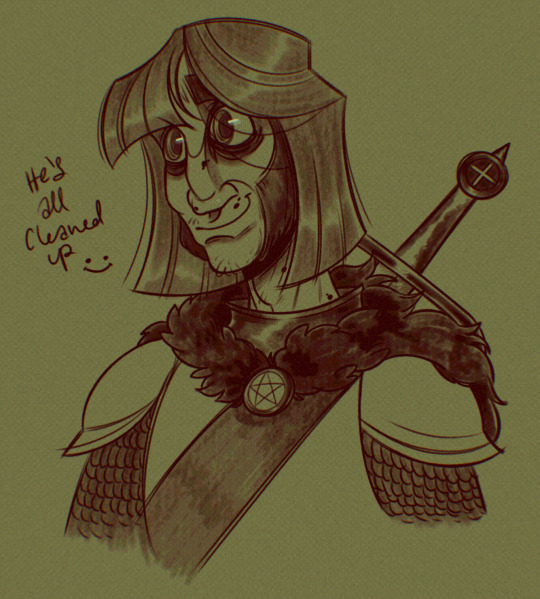
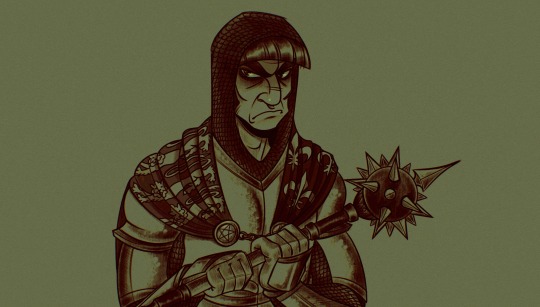
knightklok stuff
Is it headcanons or an au? I don’t know, but either way I sure as hell wrote about it.
Timeline: 1450’s-1480’s
Main Location: Pre-Sherborne/Sherborne, Sherborne Abbey Cathedral
Content Warnings: Character death, Christendom, religious fundamentalism, mentions of torture, mentions of social and systemic racism, mention of alcoholism.
Note: I subscribe to the implication that Dethklok, or even so the other people foretold in the prophecy, have been subjected to reincarnation for eons. Whether or not reincarnation is a normal aspect for everyone’s life-death cycle in the Metalocalypse universe is unknown to me as of writing this, but here I am making it certain for the pawns of the prophecy. Personally I find that the prophecy cave art in season 4, the “ancient animal forms” from season 2 and onward, and the lyrics of Blazing Star are evidence for this notion. Every force included in the prophecy are doomed to their fates; despite being placed in deadly situations time and time again, they can make it out totally unscathed until their death. Said deaths may seem sudden or untimely on a surface level, but they are always decided by destiny or the universe (or perhaps The Devil if we lean more into the Satanic narrative). Here we see a version of Dethklok from their long line of reincarnations (that also happen to be ancestral to the present-day members), who had failed to fulfill the prophecy and thus had to die and start over.
If there are severe historical inaccuracies, then my apologies, I am not a buff and I made this for fun. If it helps to ease the pain at all, I am certain if this were to actually happen in the show, it would also be incredibly historically inaccurate.
I am also not Catholic, so some things may be wonky in that context as well.
Noah Eruption
Nationality: English / Roma
Weapon: Morningstar
The surname Eruption evolved to Explosion as the English language advanced.
His looks and demeanor forgave his non-chivalrous attitude, however being a man of few words made the public mistake him for chivalrous. Nonetheless his stature and steadfast fighting ability granted him both knighthood and the role of leader for the Sherborne Guard. Born in Canterbury, Noah traveled to Sherborne for personal independence and to no longer deal with those that knew of his mixed Romani bloodline. His morningstar was his closest companion.
Fled and retired to The Western Isles post-exile. In retirement he turned to cattle farming.
Death: Drowning (reason ruled unknown, speculated to be either suicide or accident)
Aengus “Picil (The Ruthless)” Barrel
Nationality: Irish
Weapon: Dual-Wielded Scottish Dirks
The surname Barrel derives from his English grandfather’s favourite pub.
Picil, freeloader son of a shepherd, lived at his village’s pub. Of course, this habit kind of ruined his life and reputation within his hometown, however he did get some decent knife-tossing skills out of it. The pub eventually changed ownership, and consequently he was banned for being a pest. In some spark of clarity, the young man decided to start off on a clean slate. He packed a bottle for the road and headed for England (I reiterate short-lived clarity was mentioned, not intelligence). As a stumbling Irishman his time living there was incredibly difficult, but upon meeting Noah and Bishop Offgyrdd seemingly by coincidence he was “taken in,” so to speak.
And yes, his classic dirks slightly resemble penises, like God intended.
Fled to Wales post-exile.
Death: Went into the wood at night in a typical drunken stupor and was never seen again.
William “The Barbarian” “The Royal Guard’s Boil” “Barnacle Meat” Murdgruff
Nationality: English-Italian/Ethiopian (see Medieval Ethiopian Discovery of Europe)
Weapon: Battle Axe
William Murdgruff fled from Italian slums as a young adult, in fear of further discrimination and possible death. He hid in a cart of hay bales and went wherever it took him. Sherborne did not treat him much better upon his arrival, even less so than expected, but the Bishop of the village saw his potential. Murdgruff then proved himself to be a merciless fighter, and with the strong persuasion of Bishop Offgyrdd, he was knighted by the Lord and assigned to the small guard sanctioned in that very town. An exchange was brought in return for his knighthood– that he would keep his appearance a secret from the public, as it would damage the church’s reputation. They even commissioned a custom helmet in order for him to fulfill such an order. He did as told, however that did not stop him from becoming the town’s punching bag due to how he held himself (and having the most non-chivalrous of attitudes, obviously).
Fled to Germany post-exile.
Death: Tortured and Executed via Wheel at the beginning of The Werewolf Trials after fleeing to Germany.
Sigfrøðr / Sighfridh Swkigelf
Nationality: Geat
Weapon: Knightly Sword, though prefers Falchion
Irregular for the time and place, Sighfridh was born to closeted Heathen parents. Their Geatland patriotism imprinted onto him, but he found himself drawn to the Christian environment surrounding his family. Sighfridh saw himself not only in Odin, but in both the Lutheran and Catholic depictions of the Lord. In interest of visiting an authentic Roman Catholic cathedral, he decided to journey west. His stay in England was supposed to be temporary, especially after Toki began to accompany him on his journey, but finding good work with the Sherborne Guard (along with acclaim from all the English ladies…) Sighfridh stayed until the group’s exile.
Before England, Sighfridh was an ice harvester.
Returned to Scania post-exile.
Death: Disease of Totally Unknown Origin (it was definitely not syphilis).
Toki Wartúþr
Nationality: Norwegian/Norse
Weapon: Knightly Sword
(To my knowledge the name Toki has existed since like ~7th Century AD, so I find it perfectly sensible that the name Toki would be present multiple times throughout his family tree.)
He was a Sami boy adopted by Christian parents as a babe. Blessed with the spirit of death, his parents eventually blamed him for the unorthodox deaths of crops and farm animals, even if he was not tending to or near the area at the time of death. Their negative superstition surrounding their son grew more, soon blaming him for the rot of their food and the harsher winters. Believing him to embody the antichrist, they intended to kill him, but Toki found this out and escaped before they could execute their plan. He was a homeless wanderer for years, getting by on stolen goods and river water. It was when he ran into the traveling Sighfridh that Toki finally found some sort of path in life. To Sighfridh’s dismay, Toki was enamored with him and his journey, and so tagged along.
Exiled.
Death: Murdered.
Bishop Offgyrdd
Nationality: English/Welsh
Weapon: Holy text, witchcraft, sabre
Under the guidance of his most trusted companion, Sherborne’s Archbishop, Offgyrdd was devoted to the underbelly of the church. He typically kept an eye out for any newcomers during the day, and was a transcriber at night. Before the mysterious and gruesome death of Canterbury’s Archbishop, Offgyrdd was– although emotionally distant– an average abbott. Even though transcribing was work for a lower monk, Offgyrdd happily took on the task for The Church of The Black Klok. The loose lips on the group of knights he brought together was ultimately his, their, downfall. From Sherborne Castle, the royal guard was demanded to put an end to this heresy, but they refused. Because they liked Offgyrdd. He was pretty nice to them after all, you know? Their Lord allowed for word— panic— to get out due to this. Reeves and the rest of the general public ended up taking matters into their own hands. The traitorous royal guard’s executions were debated. The enraged mob was still somehow infatuated with them, despite their association with witches. Out of fear of his own life, the Lord mercifully damned the knights to exile. After the beheading of the Archbishop, the last thing Offgyrdd saw was Noah watching his demise from among the crowd.
Thankfully, the actual Black Klok meeting grounds were never found by authorities.
Death: Executed; burned at stake.
#I’m kinda forcing myself to post this#feels justified with how much time I put into it#I understand things aren’t fully fleshed out either so take it as you will#metalocalypse#fan art#svetzstuff#hope y’all like the art at least <3#also thanks so much if you read all that..
122 notes
·
View notes
Note
I don't intend to start an argument with you, I only wanted to tell you this genuinely from one Christian to another, and you can take it however you want (I am not expecting a response either so you don't have to publish this). To be frank it is a little hurtful and disappointing to see a faithful Catholic engaging with that post about foreign cultures and Halloween. I celebrate Halloween primarily as All Hallow's Eve because I am a Catholic, and to some extent as a silly cultural holiday because I am someone who lives in a culture where it's an opportunity to have fun with your community. But I'm also someone who is of non-white descent and I do participate in some foreign cultural elements to bond with my family and honor my ancestors—nothing religious, but it does include things like our traditional cultural dress, and it is important to me that people respect the history and significance and don't treat it as a frivolous costume (not to say that nobody else can wear it, just maybe not as a cheap novelty toy or mockery). Catholicism does include people from all around the world, even if we aren't the majority. And I understand people's frustration with immigrants who do little to contribute or assimilate with Western nations, but the reality is that nowadays there are also many of us who were born and raised here and mostly only retain superficial or ceremonial ties to our ancestral nations. I may be mistaken for someone who just landed with a visa yesterday but English is my preferred language and I'm most used to and loyal to America. All this to say, I'm not trying to fight with you and call you a racist or whatever, but I just wanted to ask you to consider reflecting about it because I have known people who feel ostracized from Christianity because they have met people who acted like it was a white religion for white people, or like they won't be treated with respect if they convert. Our attitudes as Christians speak volumes, you know? No need to go full DEI about it but posts like that give off the message of judging people only on their appearance and of other races being inferior, and it could cause scandal. God bless :)
Halloween is a Christian holiday, like Christmas or Easter. I have no patience for anyone who isn't Christian celebrating it for any reason. I don't care what race you are, if you aren't Christian, you can't have our stuff and do whatever you want with it. I take issue with people who come to historically Christian nations and treat Christian things built by Christians to practice Christianity like those things are public property. Christians built western civilization, we didn't find it on the ground. Not everyone is entitled to it, and if you want to be a part of Christendom, CONVERT.
4 notes
·
View notes
Text
Quinn, Lestat, and Mona in Blood Canticle, brought to you by me and my sibling. My sibling was surprised to hear that I had never seen someone attempt to bring their silly little outfits from this scene to life before, so the next thing I knew I was being sent a sketch to finish up and post. Enjoy! 😂
No but seriously these outfit choices are insane. Gold three-piece suit with a lavender dress shirt and sequined tie; three-piece "butter-soft" leather suit with purple turtleneck and "the shiniest boots in Christendom;" and Aunt Queen's strapless dress lined with ostrich feathers and black heels studded with rhinestones. Gotta love it.

The scene it's based on:

8 notes
·
View notes